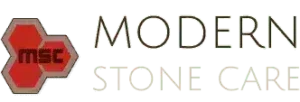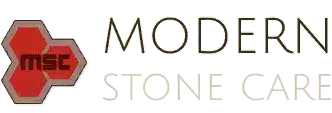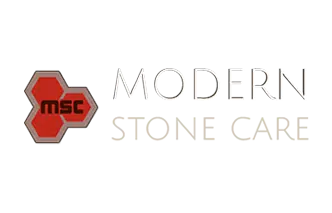Slate Floor Cleaning Services Houston
MODERN STONE CARE SLATE SERVICES
Houston Slate Cleaning:
Due to the texture and graininess of this particular stone, a good amount of dirt can build up in its crevices. Generally, we will clean slate with an alkaline cleaning solution because it is the best at emulsifying dirt. We give the solution approximately 20 minutes of dwell time. This gives the cleaner time to depolarize the dirt that is embedded into the stone. We then use an industry accepted spinner tool which provides pressure coupled with vacuum for extraction.
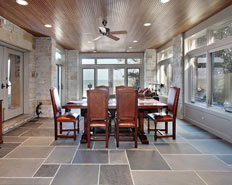
Houston Slate Sealing:





ABOUT SLATE
Shale is a clay stone that is fissile, or splitting in layers. Slate is a low-grade metamorphic rock which begins as shale. When shale is put under pressure, and has temperatures of a few hundred degrees, the clay begins to revert back to the mica minerals from which they formed. This process hardens the shale and gives it the slatey cleavage foliation which allows it to be split into flat planes.
Slate is typically green in color due to its chlorite content, but can be gray or black if organic matter is present. It can also be red, purple, or brown with a high content of iron oxides. Slate with high iron oxides are poor for wet environments such as showers or pool surrounds, due to the fact that moisture will cause further oxidation of the iron, and eventually degradation of the stone itself. Sealing slate in these environments is imperative, and will prolong the life of the stone. Through further metamorphism, slate becomes phyllite and eventually either schist, or gneiss, which is used as mercantile granite countertops.
Shale is often sold as slate by lower quality flooring retailers and some big box home improvement stores. When wet, shale will smell like clay, and actually lose some of its color when wiped with a rag. It will also make a dull “thud” when tapped with a hammer. Slate will not smell like clay when wet, and will “ting” when tapped with a hammer. True slate is one of the least absorbent stones on earth while shale will have a high porosity.
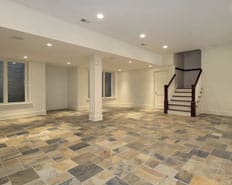
CARE AND MAINTENANCE OF SLATE
Mercantile slate is a stone with directional cleavage. Anytime you have foliation of a stone, dirt will become trapped in the lower levels on the surface of the stone. For this reason, slate floors require a maintenance plan to keep them looking as nice as possible. This should consist of dry dust mopping daily using a clean rayon mop or static pad. Vacuuming with a hard surface vacuum will also work. This is to remove the dirt and debris that accumulates on your floor because of foot traffic, pets etc.
It is important to remove this dirt because damp mopping is also required at least weekly. If the dirt and debris that accumulates is allowed to remain on the floor, when damp mopping occurs, that dirt is turned into mud and is pushed into the grout lines by the mop. This will make your grout lines dirty very fast. When damp mopping with soap, rinsing will be required. After mopping with any soap solution, use a different rinse mop, and go over the area again with clean water. We recommend cleaning slate at least annually and in some cases, bi-annually.
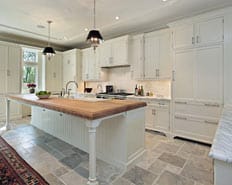
LATEST ARTICLES
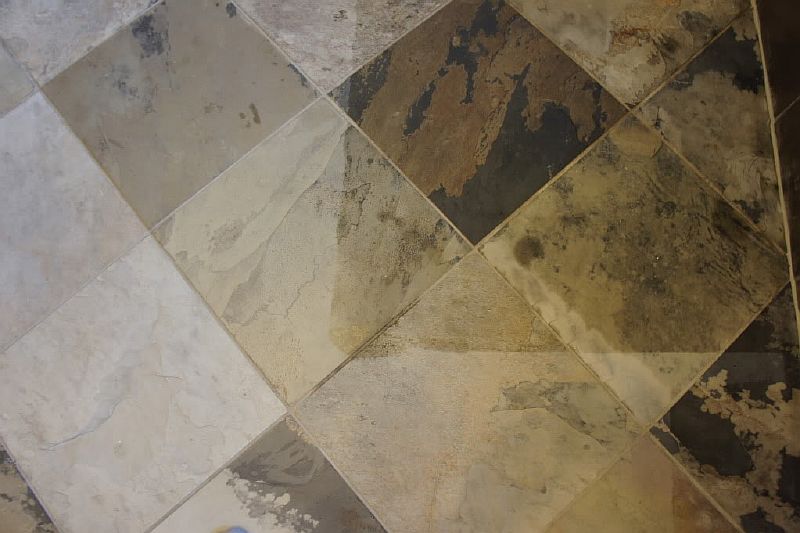
Slate Flooring Maintenance Care Tips
Do you have slate tile flooring in your home? These floors are resilient against normal wear and tear when you stay on top of your at-home and professional maintenance. The best thing you can do in order to preserve them is clean your slate floors regularly and to seal your slate floors at regular intervals. Listed below are slate flooring maintenance care tips to prevent staining and preserve your floors. Dust Mop the Floor Dust mop the entire floor with a high-quality, machine-washable dust mop. Start at one end of the floor and push the mop toward the other end, using the same motion for the entire floor. Do not move the mop back and forth because it will simply spread around the dirt and grit. Work in defined sections at a time, and sweep up the line of accumulated dirt and grit before moving on to the next section. Mop the Floor Damp-mop the floor with a high-quality washable mop and plain water. For occasional deep cleaning, you can also add a few drops of mild detergent, such as dish soap or fabric detergent for delicate fabrics (such as Woolite) to the wash water. Don’t allow large puddles of water to form, and don’t leave water on the surface. If you use detergent in the water, rinse the floor thoroughly with plain water. Let the floor dry completely before walking on it. Remove Stains Spot-treat stains with ordinary isopropyl rubbing alcohol and water. Mix 1/2 cup of alcohol with 1 quart of water. Dip a sponge into the solution and wipe at the stain. If necessary, scrub the stain with a towel or cloth. Alternatively, use a cleaning solution of a few drops of hydrogen peroxide mixed with a quart of water, applying it with a sponge and/or towel. Prepare to Seal the Floor Plan to seal the floor if it is unsealed or is ready for a fresh coat of sealant. If the floor has traces of an old sealant or it has been waxed, you may need to use a chemical stripper to thoroughly clean the surface. Wax can be removed with a wax stripper. Other types of sealers, such as acrylic or urethane coatings, may require strong solvent strippers, and you may want to leave this to a stone flooring or restoration professional. If you applied the original sealant (or you had a professional do it), […]
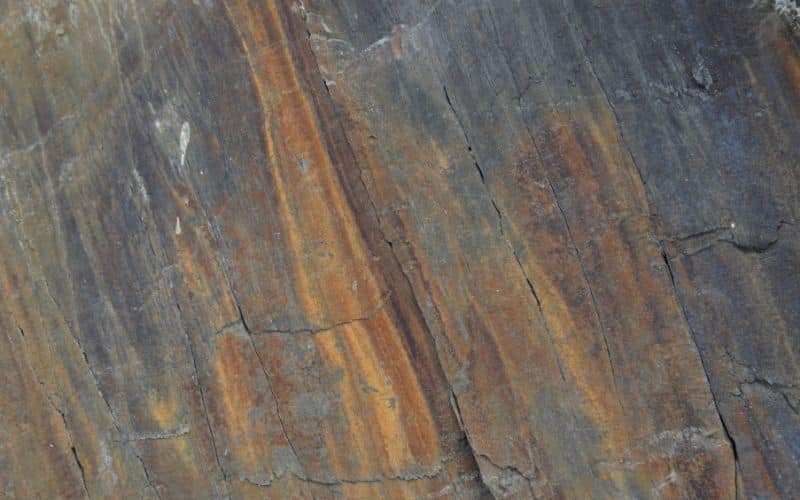
Is Slate A Man-Made Material?
What is Slate? According to Geology.com Slate is a fine-grained, foliated metamorphic rock that is created by the alteration of shale or mudstone by low-grade regional metamorphism. It is popular for a wide variety of uses such as roofing, flooring, and flagging because of its durability and attractive appearance. Composition of Slate Slate is composed mainly of clay minerals or micas, depending upon the degree of metamorphism to which it has been subjected. The original clay minerals in shale alter to micas with increasing levels of heat and pressure. Slate can also contain abundant quartz and small amounts of feldspar, calcite, pyrite, hematite, and other minerals. Slate is not a man-made material, it is constructed of organic matter. Slate typically naturally occurs in grey tones, from light to dark. While slate is mostly seen in grey tones, there are also variations of slate that are more green, red, black, purple, and brown. The color of slate is revealing about the type of organic materials that are found in the rock. How is slate used in a home? Slate is a durable rock that is suitable for use as flooring, stair treads, sidewalk slabs, and patio stone. It is also produced in a variety of colors that allow it to be incorporated into a variety of design projects. Slate Cleaning in Houston TX Compared to many other natural stone materials, slate is relatively easy to care for. The general maintenance can be handled at home on your own, however, for a deep clean working with a professional natural stone maintenance company, like Modern Stone Care, can help protect your stone. Professional cleaning will help you to keep your slate surfaces looking great for decades. Contact us today to learn more about the natural stone services we offer and how we help protect your surfaces. Listed below is how you can help protect your natural stone surfaces: Dust-mopping: Dust, dirt and grit are the main source of issue for the surface of your slate flooring. When left on your flooring, the material can easily become scratched and marred. Slate floors that are dust-mopped often, stay cleaner and maintain their gorgeous shine for longer periods of time. For the best results, you will want to dust mop your slate floors daily. Whenever the foot traffic is high, or the flooring is located in a commercial building, this will […]
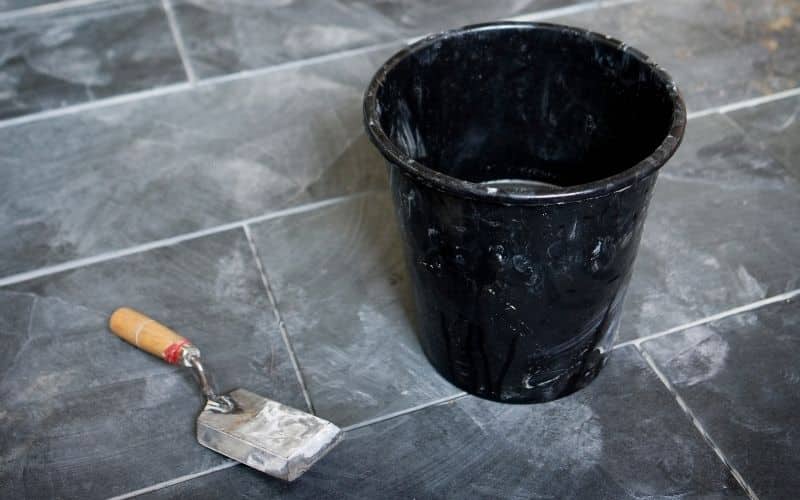
Slate Restoration in Houston
Slate flooring is a popular choice for home and business owners. This sleek-looking and affordable material makes an excellent addition to any space and will require very little upkeep in order to keep looking great for decades. Slate is often confused with manmade materials, such as concrete, however, slate is a natural stone. It comes from a fine-grained, homogeneous metamorphic rock and has become a popular floor and surface material over the last two decades. These slabs of slate are taken from an original shale-type sedimentary rock composed of clay or volcanic ash through low-grade regional metamorphism. Slate is known for being the finest grained foliated metamorphic rock in existence. Slate is a versatile material that can easily be used as flooring, countertops, backsplashes, stepping stones, roofing, and even as the interior for showers. The increase in popularity of slate as an indoor material in residential and commercial spaces is largely due to its durability, wide range of colors, and easy maintenance. Slate comes in a variety of different colors and shades, most often it is found in black and gray tones. The most frequent way we see slate used is broken down from slab into tiles, often exceeding a foot in length and width. It is believed that slate is the most commonly used natural stone in the world. Like most other natural stone materials, slate surfaces will need a strong seal in order to protect it from water and other substances that may lead to staining and scratching. The stone seal should be applied on an annual basis because it will wear down over time leaving your slate vulnerable. If you have slate floors in an area with heavy traffic, you may need to seal your slate floors more often than once a year to protect them from becoming damaged. If your slate flooring becomes stained or damaged, the slate restoration experts of Houston at Modern Stone Care can help you. We specialize in restoring natural stone floors and surfaces in order to bring them back to their original beauty. The best way to avoid damaging your slate floors and surfaces is to stay on top of annual floor maintenance. Schedule your slate cleaning and slate sealing service with Modern Stone Care in Houston today. Slate Flooring Maintenance in Houston At Modern Stone Care, our team of highly knowledgeable technicians specialize in the […]
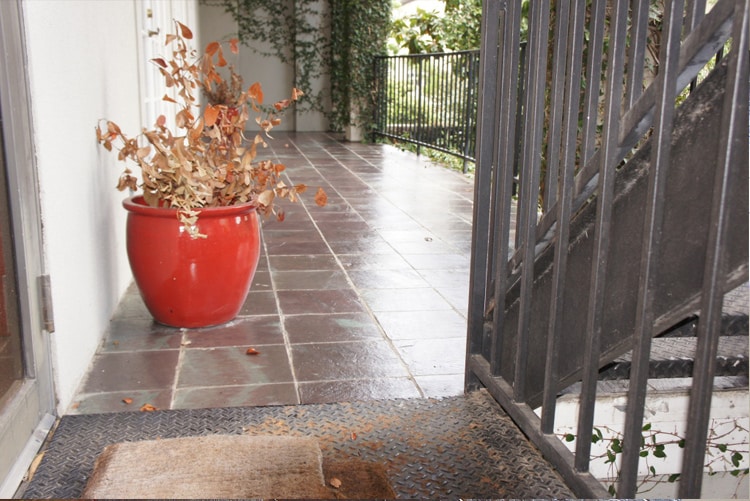
Slate Stone Polishing Houston
Is Slate Stone? In the last twenty years, we have seen an increasing popularity in the use of slate in homes and businesses. This sleek looking material makes a great addition to any space and requires very little maintenance to keep it looking great. Additionally, slate is very resilient and can last for decades when taken care of. When it comes to examining the material closer, you may find yourself asking- is this stone? Often times, slate is confused with manmade materials, such as concrete. Slate, like other natural stones, comes from a fine-grained, homogeneous metamorphic rock. These slabs of slate are derived from an original shale-type sedimentary rock composed of clay or volcanic ash through low-grade regional metamorphism. Slate is known for being the finest grained foliated metamorphic rock. What Is Slate Used For? There are several uses for this natural and versatile stone material. When it comes to adding a spark of interest to a space, slate is a simple way to achieve this goal.The most common way we see slate used in homes and businesses is as flooring. Slate is easy to clean and has the ability to fit into many different aesthetics. Other common ways we see slate being used is as countertops, in showers, backsplashes, and outdoor spaces. If you have slate in your home or business that has not been professionally maintained, it may be time to contact Modern Stone Care. We specialize in treating natural stone surfaces, ensuring they are clean and protected, in order to protect your investment and give you as much time as possible with your slate surfaces. Slate Polishing Houston Whenever your slate surfaces have lost their luster, we can help! With regular maintenance, including: cleaning, polishing, sealing, and restoring. Our team of natural stone experts are here to make your natural stone surfaces look as good as new. Whether your natural slate is brand new or you are inheriting it with a new space, we can make sure it is protected from outside influences. Living in a home with pets or children can especially be hard on slate floors. We recommend regular maintenance for your slate surfaces, this will keep your investment safe and your stone floors looking great. Do not let your natural stone surfaces go neglected! Instead, schedule an appointment with Modern Stone Care. We will get your natural stone surfaces looking great before […]
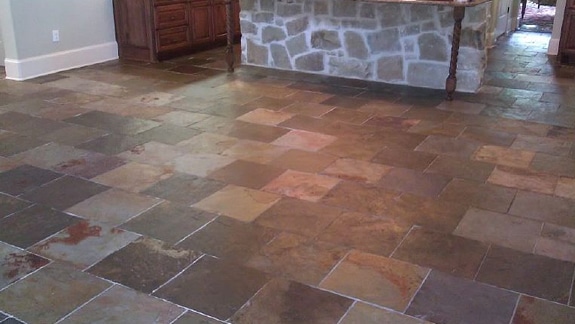
Maintaining Slate Floors in Houston
Slate is a rock that is formed through pressed mud. This makes the stone tough, durable and easy to split into layers, which makes it easy to turn into tiles. Slate can either be left in its natural- cleft state, polished, or honed. Slate is durable enough to be used as flooring, in showers, as countertops, and more. It is important to properly care for your slate to keep it in beautiful condition. Slate Cleaning in Houston Slate is a natural stone, so like many natural stones, it can present a sensitivity to some acids and alkaline cleaners. These cleaners have the potential to etch the surface of the stone leaving it’s scarred. This is especially true for honed and polished slate flooring. It is important to sweep the slate regularly, this removes the surface dirt. To properly care for your slate, you must wash the slate with a stone cleaner regularly. Be sure to avoid acidic cleaners, such as lemon or vinegar. Slate Sealing in Houston There are all types of slate that are used as flooring throughout Houston. Some of this slate flooring is made from slate tiles. Quartzites are stones that are sometimes used in the creation of these slate tiles. Most types of slate are porous, which make them susceptible to absorbing moisture, which means they are also vulnerable to staining as well. Since slate is vulnerable to moisture and stains, you should have your slate sealed at least once a year to prevent damage to the smooth appearance. If you are unsure if your slate floors need to be sealed, you can conduct a small experiment with water. Pour about half a cup of water onto your slate floors, wait ten to fifteen minutes and then wipe it away. If the place where the water was is darker, this means your slate’s surface is porous and unprotected. This is an indication that you need to seal your floors before more damage can affect the stone. If the slate does not change color this means the seal is still strong, for now, leaving you time left between seals. Slate Floor Care in Houston Modern Stone Care proudly serves The Greater Houston Area, including but not limited to, Atascocita, Bellaire, Clear Lake, Cypress, Friendswood, Houston Heights, Houston, Humble, Katy, Kemah, League City, Kingwood, Memorial, Missouri City, Montgomery County, Spring, Spring Branch, Stafford, Sugar Land, […]
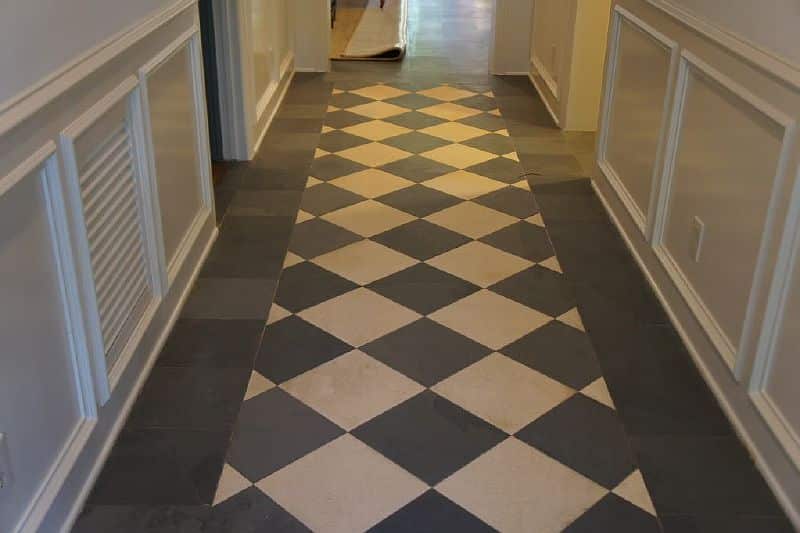
Slate Floor Polishing
Slate is material that’s very popular not only for fireplace but especially for flooring. Slate floors can add an earthly feel to a room, it has natural beauty and very durable. To maintain it beauty your slate floor need to be properly cared. With regular maintenance, your slate floors can stay warm and beautiful for years to come. Your best option for keeping your slate floors clean is to contact the experts at Modern Stone Care. Slate floors have grown in popularity over the years, the diversity was limited to just gray and pale not a lot of options to select from. Now there are hundreds to select from and in places like India there a variety of several hundreds of every imaginable colors along with textures. Slate is composed of tiny minerals such as hematite and quartz, this is what gives the shiny sparkle look to the floors. The only problem that occurs with slate floors is the polishing is different than typical use for marble and granite. Which is why the maintenance very important and is best done by professional company like Modern Stone Care. For the polishing process, the floors need to be stripped and re-done periodically. To maintain the beautiful look of slate, this need to be done every six months. Slate is a porous material of natural stone and if it not properly polished and sealed it very likely to absorbing liquids and staining. Slate surface has pockets and natural grooves that can absorb dirt, pre-chewed food and debris. The debris can tear down the surface which will make the floors look grimy. Modern Stone Care process for polishing slate floors: Bristle brushing to remove dirt and debris Vacuuming the floor surface Mopping to remove loose particles Rinse to clear all soap suds from mopping Waxing and polishing for each individual tile Reapply coating if needed to polish again To find out more information about slate floor polishing and how it’s a great choice to improve your home contact the natural stone polishing specialist at Modern Stone Care. Modern Stone Care Address: 970 Bunker Hill Rd Houston, TX 77024 (832) 814–2041 https://www.restoreyourfloors.net/
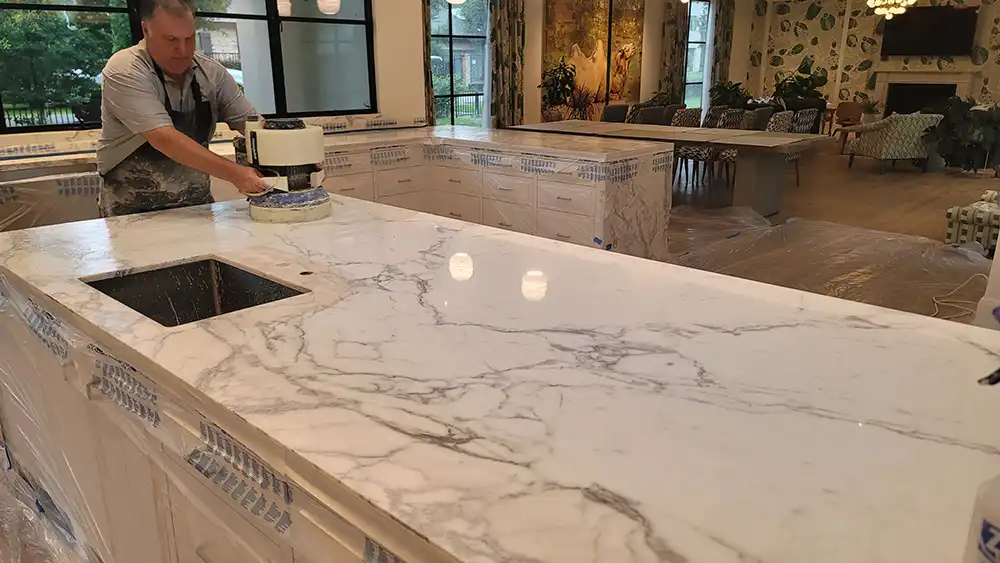
How Long Does a Seal Last on Natural Stone?
Natural stone surfaces, such as marble, granite, limestone, and slate, add an elegant touch to any home or commercial space. They are known for their durability, beauty, and timeless appeal. However, maintaining their pristine condition requires proper care and attention, especially when it comes to sealing. Sealing natural stone is crucial to protect it from stains, spills, and general wear and tear. At Modern Stone Care in Houston, we specialize in providing top-notch maintenance services for natural stone, ensuring its longevity and beauty. In this comprehensive guide, we will delve into the intricacies of sealing natural stone, including the factors that influence how long a seal lasts, the types of sealers available, and the best practices for maintaining sealed stone surfaces. Understanding the Importance of Sealing Natural Stone Natural stone is porous, which means it can absorb liquids and stains if not properly sealed. The primary purpose of sealing is to create a protective barrier that prevents the penetration of moisture, oils, and other contaminants. This barrier helps maintain the stone’s appearance and structural integrity, making it easier to clean and prolonging its lifespan. Types of Natural Stone Sealers There are two main types of sealers used for natural stone: topical sealers and impregnating (penetrating) sealers. Each type has its own characteristics and applications. Factors Influencing the Longevity of a Stone Seal The lifespan of a seal on natural stone depends on several factors, including the type of stone, the type of sealer used, the location of the stone, and the level of maintenance it receives. Understanding these factors can help you make informed decisions about your stone care routine. Type of Stone Different types of natural stone have varying levels of porosity, which affects how well they absorb sealers and how long the seal lasts. For example: Type of Sealer The longevity of a seal also depends on the type of sealer used. As mentioned earlier, impregnating sealers generally last longer than topical sealers. High-quality impregnating sealers can provide protection for 3 to 5 years or more, while topical sealers may need to be reapplied annually, especially in high-traffic areas. Location and Usage The location of the natural stone plays a significant role in determining how long the seal lasts. Stone surfaces in high-traffic areas, such as kitchen countertops, hallways, and entryways, are more prone to wear and tear, which can reduce the lifespan of the seal. Conversely, stone […]
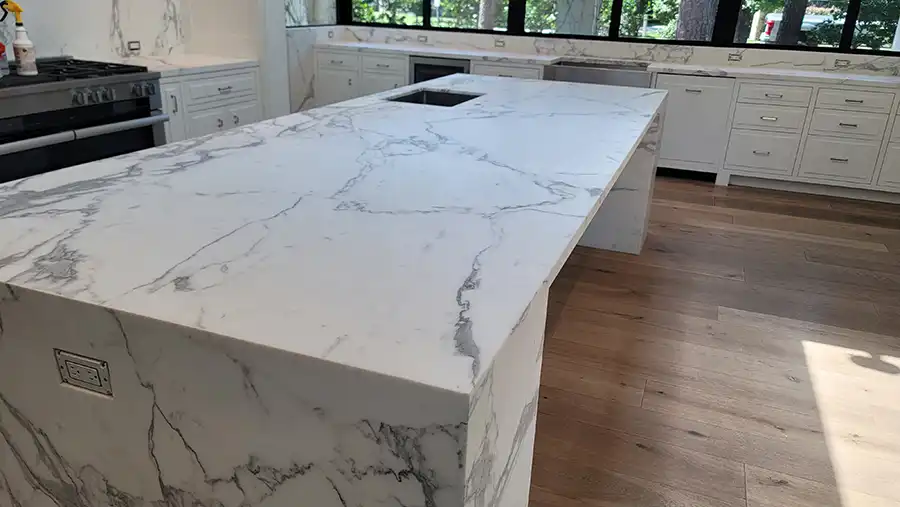
Is Natural Stone Worth the Upkeep?
Natural stone has been a symbol of luxury and timeless beauty for centuries. From the grand halls of ancient palaces to modern homes, the elegance and sophistication that natural stone brings is unparalleled. Many homeowners in Houston and beyond often wonder if natural stone is worth the upkeep. The short answer is a resounding yes. In this blog post, we will explore the many positive reasons for incorporating natural stone flooring, countertops, and accents into your home. Additionally, we will delve into the comprehensive maintenance services offered by Modern Stone Care to ensure your natural stone remains as stunning as the day it was installed. The Timeless Beauty of Natural Stone Aesthetic Appeal Natural stone offers a unique, natural beauty that is difficult to replicate with other materials. Each piece of stone is one-of-a-kind, featuring distinct patterns, colors, and textures. Whether it’s marble, granite, limestone, or travertine, natural stone can add a touch of elegance and sophistication to any space. The versatility of natural stone allows it to complement both traditional and contemporary design styles, making it a perfect choice for any home. Durability and Longevity One of the most significant advantages of natural stone is its durability. When properly maintained, natural stone surfaces can last a lifetime. Unlike synthetic materials, natural stone does not easily chip, crack, or discolor over time. This makes it an excellent investment for homeowners looking to add long-lasting value to their property. Increased Property Value Installing natural stone in your home can significantly increase its market value. Potential buyers often view natural stone as a premium feature, appreciating both its aesthetic appeal and its durability. Whether you plan to sell your home in the near future or keep it in the family for generations, natural stone is a wise investment that can enhance your property’s worth. Health Benefits Natural stone surfaces are inherently hypoallergenic. They do not harbor dust mites, mold, or bacteria, making them an excellent choice for individuals with allergies or respiratory issues. Additionally, natural stone is easy to clean and maintain, contributing to a healthier indoor environment. Eco-Friendly Choice Natural stone is an environmentally friendly building material. It is sustainably sourced from the earth and requires minimal processing compared to synthetic alternatives. By choosing natural stone, you are supporting sustainable practices and reducing your environmental footprint. Modern Stone Care’s Comprehensive Maintenance Services While the benefits of natural stone are undeniable, proper […]
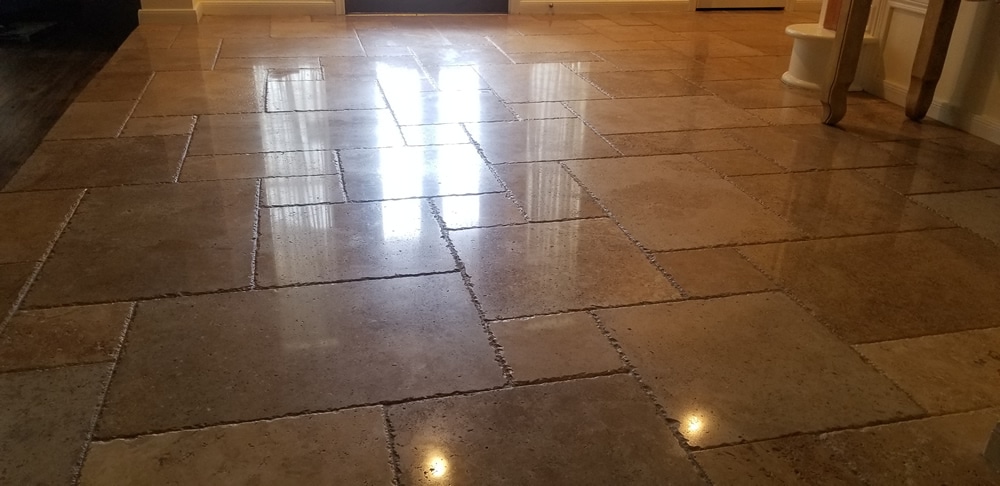
Adding Value to Your Property with Well-Maintained Natural Stone Flooring
Natural stone flooring is a hallmark of elegance, sophistication, and timeless beauty in any property. From luxurious homes to prestigious commercial establishments, the allure of natural stone transcends trends and fads. However, the true value of natural stone flooring is realized only when it is well maintained, preserving its inherent beauty and durability. In this blog post, we will explore how well-maintained natural stone flooring can significantly enhance the value of your property and how Modern Stone Care in Houston offers unparalleled stone maintenance and care services to ensure your investment remains pristine for years to come. The Appeal of Natural Stone Flooring Natural stone flooring, including marble, granite, limestone, travertine, and slate, offers a unique blend of aesthetics, functionality, and longevity. Each type of stone has its distinct characteristics, but all share the following advantages that make them a preferred choice for flooring: Aesthetic Versatility Natural stone flooring comes in an array of colors, patterns, and textures, allowing homeowners and designers to create personalized spaces that reflect their style and preferences. The natural variations in the stone add a touch of uniqueness and character to each installation, ensuring that no two floors are exactly alike. Durability and Longevity When properly maintained, natural stone flooring can last a lifetime, making it a cost-effective choice in the long run. Its durability makes it resistant to wear and tear, even in high-traffic areas, while its timeless appeal ensures it never goes out of style. Increased Property Value Properties with natural stone flooring are often perceived as more luxurious and high-end, which can significantly boost their market value. Prospective buyers and tenants are usually willing to pay a premium for homes and commercial spaces with well-maintained stone flooring. Environmental Sustainability Natural stone is an eco-friendly flooring option, as it is a natural material that requires minimal processing. It also contributes to better indoor air quality, as it does not harbor dust, allergens, or other pollutants. The Importance of Professional Stone Maintenance and Care While natural stone flooring offers numerous benefits, it requires proper care and maintenance to retain its beauty and functionality. Neglecting stone maintenance can lead to a host of issues, including staining, scratching, etching, and dullness, which can diminish its appeal and value. This is where professional stone maintenance and care services come into play. Preventing Damage Natural stone is susceptible to various forms of damage, such as scratches from heavy […]
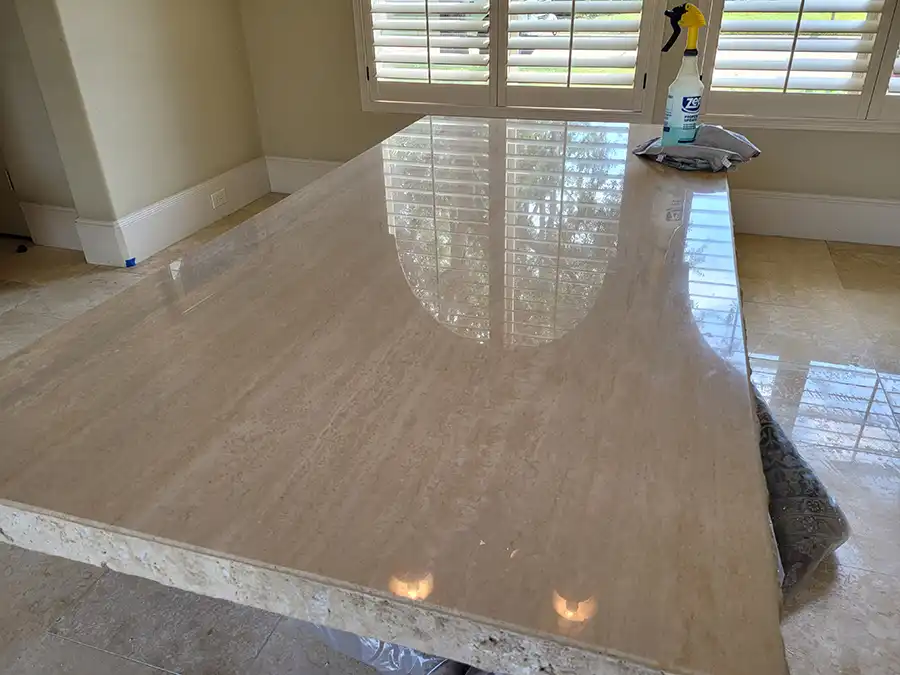
Natural Stone Surfaces Require Professional Maintenance
Natural stone surfaces have been a popular choice for centuries due to their timeless beauty, durability, and unique character. From luxurious marble countertops to rustic slate floors, natural stone adds an element of elegance and sophistication to any space. However, to maintain their stunning appearance and longevity, these surfaces require professional maintenance. In this blog post, we will delve into the importance of professional maintenance for natural stone surfaces, the types of services available, and why it’s essential to trust experts like Modern Stone Care in Houston for all your natural stone needs. Understanding Natural Stone Surfaces Natural stone surfaces encompass a variety of materials, each with distinct characteristics and maintenance requirements. Some of the most common types include: Marble: Known for its classic elegance, marble is a softer stone prone to scratching and staining. Granite: Renowned for its durability, granite is resistant to heat and scratches but still needs proper sealing. Limestone: With its subtle and natural appearance, limestone is porous and susceptible to staining and erosion. Slate: Slate offers a rustic and textured look, but its layers can peel if not properly maintained. Travertine: This type of limestone is characterized by its porous nature and requires regular sealing to prevent damage. Each type of stone has its own set of challenges and benefits, making professional maintenance crucial to preserve their beauty and functionality. The Importance of Professional Maintenance Natural stone surfaces, while durable, are not impervious to damage. Over time, they can become dull, scratched, stained, or etched due to daily wear and tear, exposure to harsh chemicals, and improper cleaning techniques. Professional maintenance ensures that your stone surfaces remain in pristine condition. Here’s why it’s essential: 1. Expert Knowledge and Techniques Professional stone care specialists possess in-depth knowledge of various stone types and the appropriate maintenance techniques for each. They are trained to identify the specific needs of your stone surfaces and apply the correct methods to clean, polish, and seal them. Using incorrect techniques or products can cause irreversible damage to your stone, highlighting the importance of relying on experts. 2. Proper Sealing Sealing is a critical aspect of natural stone maintenance. Seals act as a protective barrier against stains, spills, and moisture, preventing damage and prolonging the life of the stone. Professionals use high-quality sealants and know the correct application methods to ensure maximum protection. Regular resealing is necessary to maintain the integrity of the […]
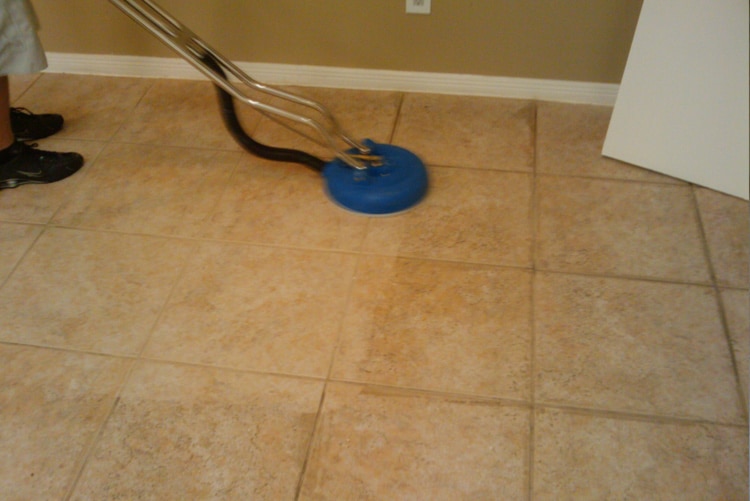
Grout Stains Are More Than Ugly They’re Unhygienic
In the bustling city of Houston, homes and businesses alike take pride in their cleanliness and aesthetic appeal. One often overlooked aspect of maintaining this appeal is the condition of grout in tiled areas. Grout stains are not only unsightly but also pose significant hygiene risks. At Modern Stone Care, we specialize in lifting even the darkest grout stains, ensuring your spaces are both beautiful and healthy. Understanding Grout and Its Vulnerability Grout is the material used to fill the gaps between tiles, commonly found in kitchens, bathrooms, and flooring. Its porous nature makes it susceptible to staining from dirt, spills, and mold. Over time, these stains can penetrate deeply, becoming difficult to remove with regular cleaning methods. The Composition and Role of Grout Grout is typically composed of cement, water, and sometimes sand or epoxy. Its primary function is to keep tiles in place and provide a finished look. However, the same properties that make grout effective at its job also make it prone to absorbing liquids and harboring bacteria. Common Causes of Grout Stains Dirt and Debris: High-traffic areas accumulate dirt that gets embedded in grout lines. Spills: Coffee, wine, and other liquids can leave lasting stains. Mold and Mildew: Humid environments, such as bathrooms, are breeding grounds for mold, which can discolor grout. Improper Cleaning Products: Some cleaners can damage grout, making it more porous and prone to staining. The Hygiene Implications of Dirty Grout While the aesthetic impact of stained grout is apparent, the hygiene implications are often underestimated. Dirty grout can harbor harmful bacteria, mold, and mildew, posing health risks to occupants. Bacterial Growth and Health Risks Grout provides an ideal environment for bacteria to thrive due to its porous nature. Bacteria such as E. coli and Salmonella can live in dirty grout lines, potentially causing infections and illnesses. This is particularly concerning in areas where food is prepared or in households with young children and elderly individuals. Mold and Mildew Concerns Mold and mildew not only discolor grout but also release spores that can affect indoor air quality. Prolonged exposure to mold spores can lead to respiratory issues, allergies, and other health problems. Bathrooms and kitchens, where humidity levels are high, are particularly vulnerable to mold growth in grout lines. Allergen Accumulation Dust and dirt trapped in grout can exacerbate allergies. Regular exposure to these allergens can lead to chronic respiratory issues, sneezing, and […]
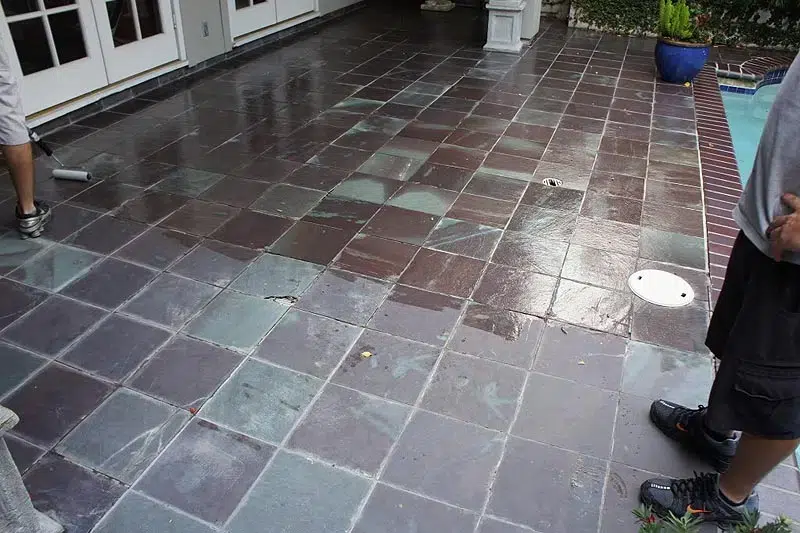
How Unsealed Stone Can Easily Become Damaged
Stone surfaces have long been celebrated for their natural beauty, durability, and timeless elegance. From luxurious marble countertops to rugged granite flooring, stone surfaces add a touch of sophistication to any space. However, maintaining the pristine condition of these surfaces requires more than just regular cleaning. One crucial aspect of stone care that is often overlooked is sealing. Unsealed stone is highly susceptible to various forms of damage, which can significantly diminish its aesthetic appeal and structural integrity over time. In this comprehensive blog, we will explore the myriad ways unsealed stone can become damaged and offer insights into effective stone care practices. Understanding Stone Porosity Before diving into the specific types of damage that can affect unsealed stone, it is essential to understand the inherent properties of natural stone. Most natural stones are porous to varying degrees. This porosity means that the stone has tiny, interconnected capillary channels that can absorb liquids and other substances. The level of porosity varies among different types of stone: Granite: Generally less porous than other stones, making it more resistant to stains and moisture penetration. Marble: Highly porous and prone to staining and etching from acidic substances. Limestone: Extremely porous and susceptible to water damage and staining. Travertine: Also highly porous and can easily absorb liquids and other contaminants. The porosity of stone makes sealing a critical step in protecting it from damage. Types of Damage to Unsealed Stone Staining Common Culprits: Liquids such as wine, coffee, oil, and juice are notorious for staining unsealed stone surfaces. When these liquids penetrate the stone, they can leave behind unsightly marks that are difficult to remove. Prevention and Care: Sealing creates a protective barrier that prevents liquids from seeping into the stone. For already stained surfaces, specialized stone cleaners and poultices can help lift stains. Water Damage Signs of Water Damage: Water spots, mineral deposits, and efflorescence (a white, powdery residue) are common indicators of water damage in unsealed stone. Impact: Prolonged exposure to moisture can weaken the stone, leading to cracks and structural deterioration. This is particularly problematic for outdoor stone surfaces exposed to rain and humidity. Prevention and Care: Regular sealing and prompt cleaning of spills can mitigate water damage. Using water repellents in high-moisture areas can provide additional protection. Etching Acidic Substances: Acidic substances like vinegar, citrus juices, and certain cleaning products can cause etching on stone surfaces, especially marble and limestone. […]

Protecting Your Natural Stone With Essential Maintenance
Natural stone surfaces add timeless beauty and elegance to any home or commercial space. Whether it’s marble countertops, granite flooring, or limestone walls, these materials offer durability and aesthetic appeal. However, natural stone is not indestructible. Various substances can damage it, leading to stains, etching, and other forms of deterioration. In this blog post, we will explore the different substances that can harm natural stone, the importance of sealing and protecting your stone surfaces, and how the experts at Modern Stone Care in Houston can help you maintain the pristine condition of your stone. Substances That Can Damage Natural Stone Natural stone, while robust, is susceptible to damage from a range of substances commonly found in households and commercial settings. Here are some of the most common culprits: 1. Acidic Substances Acidic substances are perhaps the most notorious for causing damage to natural stone surfaces. Common acidic substances include: Citrus Juices: Lemon, lime, and orange juices can cause etching on marble and limestone surfaces. Vinegar: Often used for cleaning, vinegar can quickly dull and etch stone surfaces. Wine: Red and white wines are acidic and can leave stains if not promptly cleaned. Tomato Sauce: The high acidity in tomato-based products can cause significant damage. When these substances come into contact with stone surfaces, they can cause a chemical reaction that leads to etching—a process where the stone’s surface becomes dull and rough. 2. Oils and Greases Oils and greases can penetrate the porous structure of natural stone, leading to stubborn stains that are difficult to remove. Cooking oils, butter, and even lotions can seep into the stone and leave unsightly marks. 3. Harsh Cleaning Agents Many commercial cleaning agents contain harsh chemicals that can damage natural stone. Bleach, ammonia, and other strong cleaners can strip away the sealant, making the stone more vulnerable to staining and etching. 4. Coffee and Tea Both coffee and tea contain tannins, which can cause discoloration on light-colored stones. If spilled and left uncleaned, they can seep into the stone and create permanent stains. 5. Water Spots and Hard Water While water itself is not harmful, hard water contains minerals like calcium and magnesium that can leave deposits on stone surfaces. Over time, these deposits can cause discoloration and dullness. 6. Environmental Pollutants Outdoor stone surfaces are exposed to environmental pollutants like acid rain, bird droppings, and airborne dirt and dust. These pollutants can degrade […]
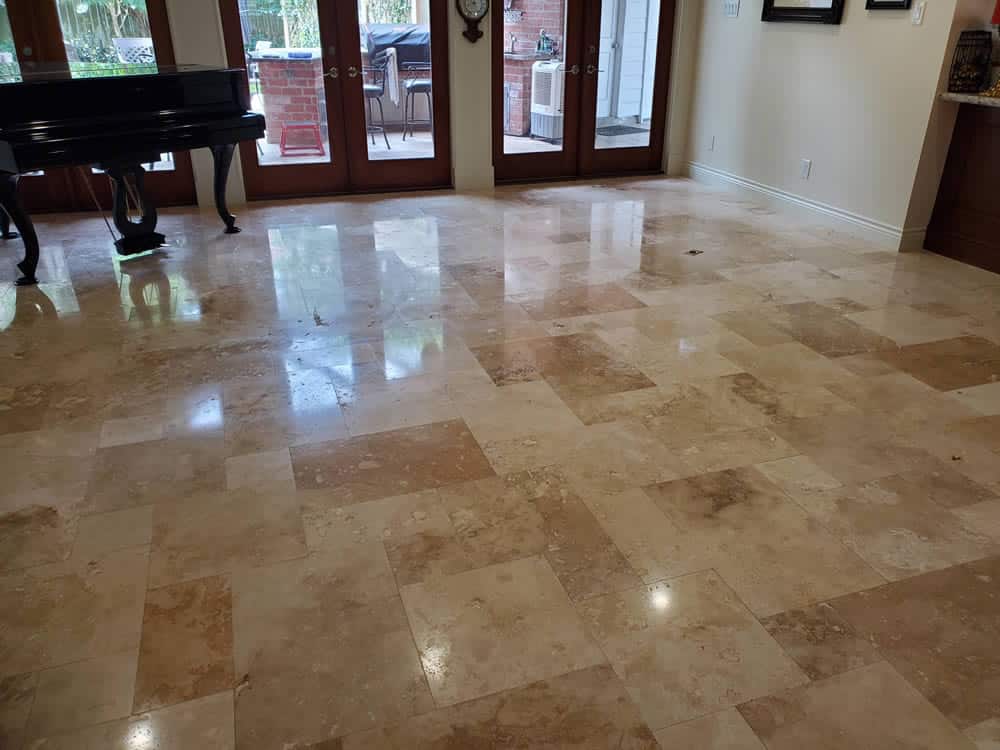
Affordable Houston Natural Stone Cleaning Service
Natural stone surfaces bring a touch of elegance and sophistication to any home. From luxurious marble countertops to rustic slate flooring, the beauty and durability of natural stone are unparalleled. However, maintaining this beauty requires regular cleaning and care. In Houston, Modern Stone Care stands out as the premier choice for both at-home and professional natural stone cleaning services. In this comprehensive blog post, we will explore the importance of keeping your natural stone surfaces clean, the benefits of professional cleaning, and how Modern Stone Care offers affordable, effective, and convenient services to meet all your stone care needs. The Importance of Keeping Natural Stone Surfaces Clean Natural stone surfaces, while durable, are susceptible to damage and staining if not properly maintained. Here are several reasons why regular cleaning is essential: 1. Preservation of Aesthetic Appeal Natural stone is known for its unique patterns, colors, and textures, which can be dulled by dirt, grime, and spills. Regular cleaning helps maintain the natural beauty and shine of the stone, ensuring it remains a focal point in your home. Clean stone surfaces reflect light better, creating a more inviting and aesthetically pleasing environment, and showing off the true beauty of the stone. 2. Prevention of Damage Stones like marble, travertine, and limestone are porous and can absorb liquids, leading to stains and etching. Regular cleaning helps prevent these substances from penetrating the surface and causing permanent damage. By keeping the surface free of abrasive particles, regular cleaning reduces the risk of scratches and surface wear, thus preserving the stone’s integrity. 3. Health and Hygiene Dirty stone surfaces can harbor bacteria, mold, and mildew, posing health risks to your family. Regular cleaning reduces these risks, ensuring a healthier living environment. Especially in kitchens and bathrooms, where stone surfaces are common, keeping them clean helps control bacteria, mold, and allergens that can affect your family’s health. 4. Longevity Proper maintenance extends the life of your natural stone surfaces. By preventing damage and maintaining the stone’s integrity, you can avoid costly repairs and replacements. Regular cleaning and maintenance ensure that your stone surfaces remain in good condition for many years, preserving their functionality and beauty, which in turn saves you money in the long run. 5. Investment Protection Natural stone surfaces are a significant investment. Regular cleaning helps maintain their value, ensuring you get the most out of your investment over time. Well-maintained stone surfaces […]

Reverse Your Indoor and Outdoor Grout Stains
Grout stains are a common problem faced by many homeowners. Over time, the pristine lines between tiles can become discolored due to dirt, mold, mildew, and other contaminants. Whether it’s in your kitchen, bathroom, or outdoor patio, grout stains can make your space look unkempt and aged. This comprehensive guide will help you understand how to reverse indoor and outdoor grout stains, restoring the beauty of your tiled surfaces. Understanding Grout and Its Vulnerability to Stains What is Grout? Grout is a porous material used to fill the gaps between tiles. It is made from a mixture of cement, water, and often sand, which makes it susceptible to absorbing moisture and stains. The primary purpose of grout is to keep tiles in place and prevent them from shifting. However, its porous nature also makes it a magnet for dirt and grime. Common Causes of Grout Stains Understanding the causes of grout stains is the first step in effectively reversing them. Grout is a porous material, which makes it susceptible to staining from various sources. Let’s delve deeper into the common causes of grout stains. Dirt and Dust High foot traffic areas like kitchens, entryways, and hallways are particularly prone to dirt and dust accumulation. As people walk over these areas, they bring in dirt and debris from outside, which can settle into the grout lines. Over time, this dirt gets embedded in the porous surface of the grout, causing it to appear dirty and discolored. Regular sweeping and mopping can help reduce the buildup, but once the dirt has penetrated deeply, it requires more intensive cleaning. Mold and Mildew Bathrooms and other damp areas are breeding grounds for mold and mildew. The combination of moisture, warmth, and poor ventilation creates the perfect environment for these fungi to thrive. Mold and mildew not only discolor the grout but can also pose health risks. They often appear as black or greenish stains and can be difficult to remove without proper cleaning methods. Ensuring adequate ventilation and promptly addressing leaks and standing water can help prevent mold and mildew growth. Spills and Stains Kitchens are especially vulnerable to spills from food and drinks. Spills from coffee, wine, sauces, and other substances can quickly stain the grout if not cleaned up immediately. The porous nature of grout allows these liquids to seep in, leading to stubborn stains that can be challenging to remove. Regularly […]
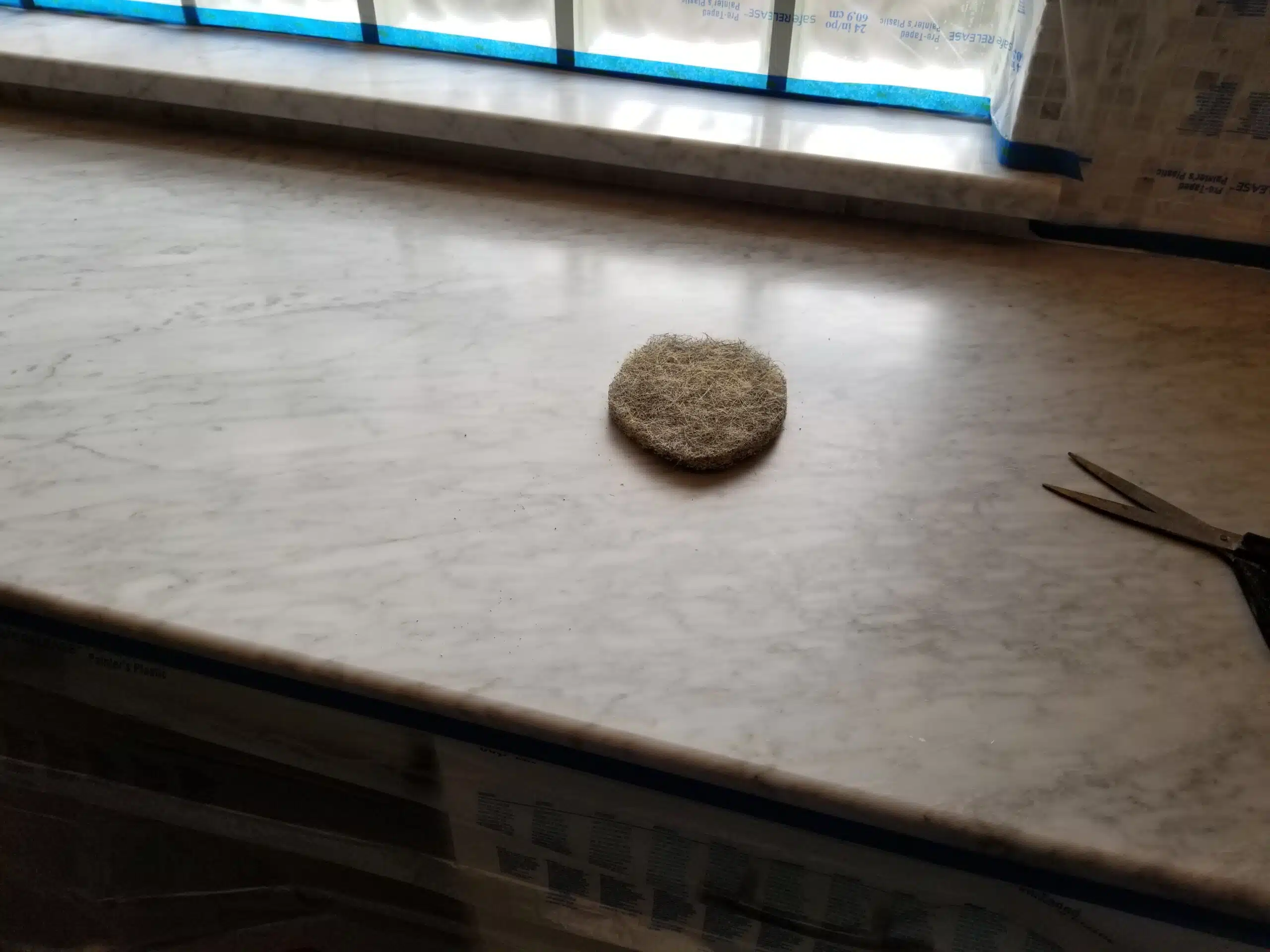
Why Do My Stone Countertops Look Cloudy and Dull?
Natural stone countertops are a beautiful and luxurious addition to any kitchen or bathroom. However, over time, they can start to look cloudy and dull, detracting from their original elegance and shine. This is a common issue faced by many homeowners, but understanding the causes and solutions can help restore the luster of your stone surfaces. In this comprehensive guide, we will delve into the vulnerabilities of natural stone, the specific factors that contribute to cloudy and dull appearances, and why Modern Stone Care in Houston is the best choice for restoring and maintaining your stone countertops. Understanding Natural Stone and Its Vulnerabilities Types of Natural Stone Natural stone countertops come in various types, each with unique characteristics: Granite: Known for its durability and variety of colors and patterns. Marble: Prized for its classic beauty and veining, but more prone to scratches and etching. Quartzite: Harder than granite, with the look of marble. Limestone: Softer and more porous, often used for a rustic look. Slate: Durable and resistant to heat, but can be brittle. Each type of stone has its own maintenance needs and vulnerabilities, which can impact its appearance over time. Porosity and Absorption Natural stone is porous to varying degrees, which means it can absorb liquids and stains. The porosity of a stone determines how susceptible it is to absorbing substances that can cause discoloration and cloudiness. For instance: Granite: Less porous than marble, but still needs regular sealing. Marble: Highly porous and prone to etching from acidic substances. Limestone: Very porous, requiring frequent sealing and careful maintenance. Quartzite: Less porous, but still benefits from sealing. Slate: Low porosity, but can absorb oils and grease. Susceptibility to Etching and Scratching Certain types of natural stone, particularly marble and limestone, are susceptible to etching and scratching. Etching occurs when acidic substances, such as lemon juice, vinegar, or wine, come into contact with the stone, causing a chemical reaction that leaves dull spots or marks. Scratches can also occur from everyday use, particularly in high-traffic areas like kitchens. Causes of Cloudy and Dull Stone Countertops Several factors can contribute to the cloudy and dull appearance of stone countertops. Understanding these causes can help in preventing and addressing the issue effectively. Residue Buildup from Cleaning Products One of the most common causes of cloudy countertops is the buildup of residue from improper cleaning products. Many household cleaners contain chemicals that can […]
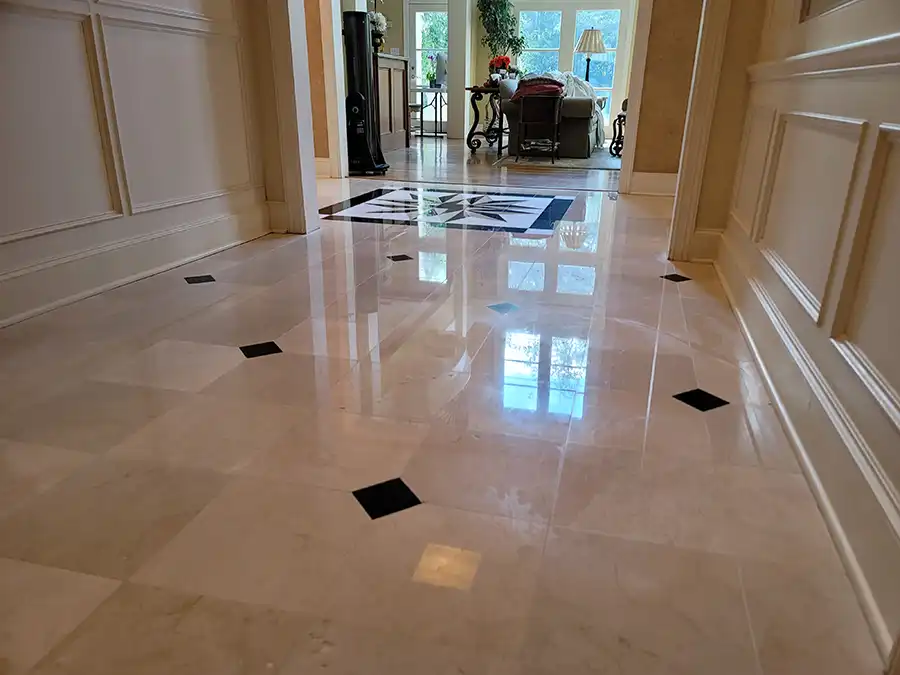
Protecting Your Investment The Importance of Routine Stone Resealing
Modern Stone Care in Houston specializes in the care and maintenance of natural stone surfaces. Our expertise spans across various types of natural stone, including granite, marble, limestone, and more, ensuring that these beautiful materials maintain their allure and integrity over time. Natural stone, with its timeless beauty and durability, is a popular choice for both residential and commercial spaces. It adds a touch of elegance and sophistication that few other materials can match. However, maintaining the pristine condition of natural stone requires more than just regular cleaning; it necessitates a proper maintenance regime that includes regular resealing. In this blog post, we will explore the reasons why natural stone needs to be resealed regularly. We’ll look at the properties of natural stone, what deteriorates its sealant, how to tell when resealing is necessary, and how often it should be done. Understanding these aspects will help ensure that your stone surfaces continue to look spectacular year after year. Understanding Natural Stone and Its Properties Natural stone is not just chosen for its aesthetic appeal but also for its durability and longevity. However, the key to maintaining these qualities lies in understanding the inherent properties of the stone. Natural stone such as granite, marble, limestone, and slate has unique characteristics that make each type distinct. Porosity: One of the most critical properties of natural stone is its porosity, which refers to the stone’s ability to absorb liquids. The higher the porosity, the more susceptible the stone is to staining and water damage. For example, marble is more porous than granite, making it more likely to absorb spills and stain if not properly sealed. Absorbency: Linked closely with porosity, absorbency affects how much and how quickly a stone can absorb spilled substances. This can lead to discoloration and deterioration over time if the stone is not adequately protected with a sealant. Durability: While natural stone is known for its toughness, its durability can be compromised if the stone is not sealed correctly. Unsealed or poorly sealed stone can be easily scratched, chipped, or cracked, particularly in high-traffic areas. Sealing natural stone helps to mitigate these issues by providing a protective barrier that minimizes the stone’s porosity, enhances its resistance to spills, and maintains its aesthetic appeal. Next, we will delve into the purpose of sealing natural stone and how it benefits the longevity and beauty of these surfaces. The Purpose of Sealing […]
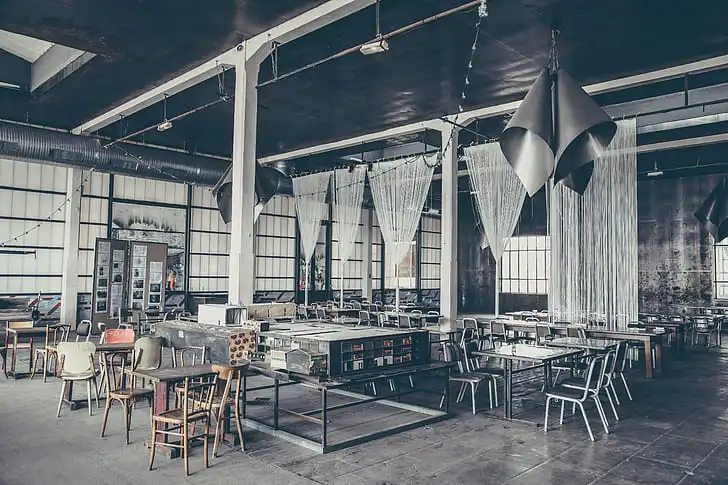
Professional Stone Cleaning and Maintenance for Restaurants in Houston
The Appeal of Natural Stone in Restaurants Natural stone surfaces, such as marble, granite, and limestone, add a touch of elegance and sophistication to any restaurant. These materials are known for their durability and unique aesthetic appeal, which can enhance the ambiance and attract customers. However, maintaining the pristine condition of natural stone surfaces in a high-traffic environment like a restaurant requires specialized care. Regular professional cleaning and maintenance are essential to preserve the beauty and longevity of these surfaces, ensuring that they continue to make a positive impression on patrons. The Challenges of Natural Stone in Busy Environments While natural stone is renowned for its resilience, it is not immune to the daily challenges encountered in a bustling restaurant setting. High foot traffic, frequent spills, and the movement of furniture and equipment can contribute to significant wear and tear on natural stone surfaces. The heavy use of these surfaces means they are constantly exposed to potential damage from shoes, chairs, and other furniture being moved across them. This continuous activity can lead to scratches, scuffs, and other forms of physical damage. Additionally, the porous nature of many natural stones, such as marble and limestone, makes them particularly susceptible to staining from food and drink spills. Substances like wine, coffee, and oil can easily penetrate the stone’s surface, leaving behind unsightly stains that are difficult to remove with regular cleaning methods. In a restaurant, where spills are almost inevitable, this vulnerability can quickly become a significant problem. Over time, dirt and grime can accumulate in the microscopic pores of the stone, causing the surface to appear dull and worn. This buildup not only affects the stone’s appearance but can also compromise its structural integrity. Regular sweeping and mopping are often insufficient to remove these deeply embedded particles, which is why professional cleaning is essential. The presence of food particles and moisture can create an environment conducive to bacterial growth. In a restaurant, maintaining high standards of cleanliness is paramount for both aesthetic and health reasons. The porous surface of natural stone can harbor bacteria and other pathogens if not properly cleaned and maintained, posing potential health risks to both staff and patrons. Addressing these challenges requires more than just routine cleaning; it necessitates professional stone care to prevent lasting damage and deterioration. Professional stone care specialists have the expertise and tools needed to thoroughly clean and protect natural stone surfaces, […]
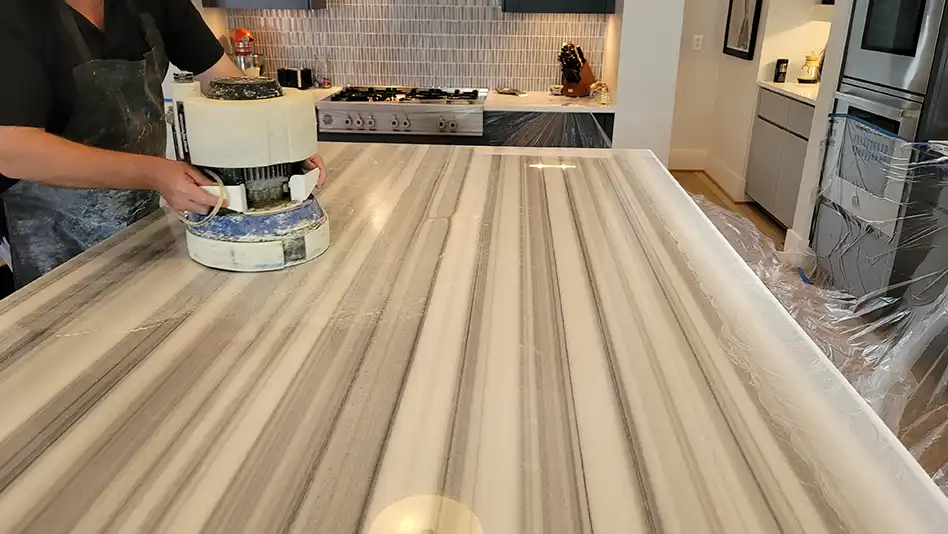
Top 20 Threats to Your Natural Stone Surfaces
Natural stone surfaces, such as granite, marble, and limestone, add elegance and value to any home. However, these surfaces require careful maintenance to preserve their beauty and longevity. At Modern Stone Care in Houston, we understand the unique needs of natural stone, and we’re here to help you protect your investment. Here are the top 20 threats to your natural stone surfaces and how you can avoid them. Acidic Substances: Acids are among the most formidable enemies of natural stone, especially vulnerable materials like marble and limestone. Common household items such as lemon juice, wine, and vinegar contain acids that can etch into the surface of these stones, leaving dull, sometimes irremovable marks. This chemical reaction not only affects the aesthetic but can also weaken the stone’s integrity over time. To protect your stone surfaces, it’s crucial to wipe up any acidic spills immediately and to use coasters under acidic drinks to prevent contact with the stone. Oil-Based Stains: Natural stone is porous, which means oil can easily penetrate and leave lasting stains that are difficult to remove. Common sources of oil stains on stone surfaces include cooking oils, lotions, and other greasy substances. If these oils are not cleaned up promptly, they can seep deep into the stone, creating stains that may require professional treatment to remove. To prevent such damage, it’s essential to address spills quickly and to use cleaning products specifically designed for stone care. Hard Water: In areas with hard water, the high mineral content in the water can leave deposits on natural stone surfaces. These deposits, often calcium or lime, can build up over time, leading to unsightly stains and potential damage to the stone’s finish. Regular cleaning with a water softener or installing a whole-home water softening system can significantly mitigate these effects. Additionally, drying stone surfaces after they come into contact with water can prevent mineral deposits from setting in. Abrasive Cleaners: Using harsh cleaning products or abrasive pads on natural stone can cause scratches and dull the surface. Many common household cleaners are too harsh for delicate stone surfaces and can strip away sealants, making the stone more vulnerable to staining and wear. To maintain the luster and integrity of natural stone, it is advised to use cleaners specifically formulated for stone care and to use soft cloths or sponges for cleaning. Spills: Spills, particularly of acidic or heavily pigmented substances like […]
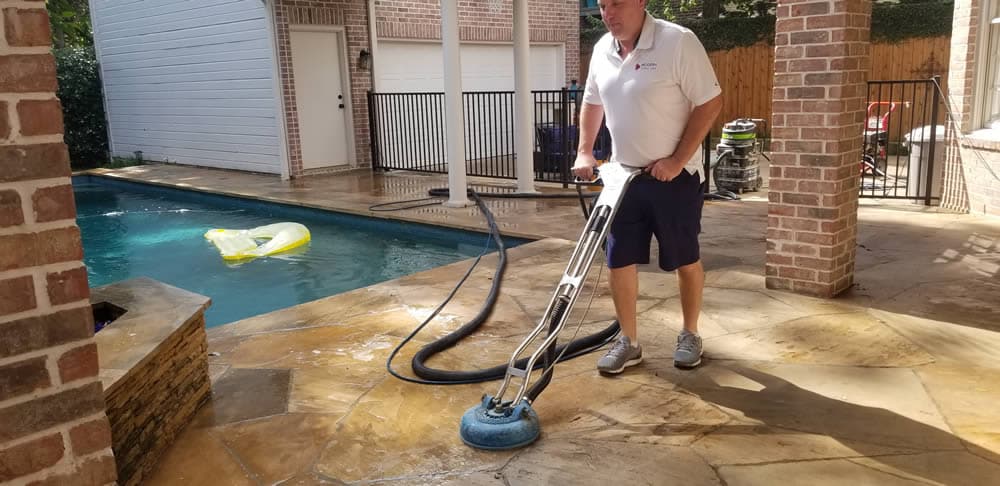
Protect Your Outdoor Stone From Sun and Heat Damage
Houston’s scorching sun and intense heat can be tough on outdoor stone surfaces. Whether it’s a slate patio, a limestone walkway, or a marble fountain, the relentless Texas sun can dull the luster and degrade the integrity of your stone features. At Modern Stone Care in Houston, we understand the challenges your stone surfaces face and have compiled expert advice on protecting them from sun and heat damage. This guide will cover everything from routine maintenance to professional treatments that can extend the life and beauty of your outdoor stone. Understanding the Impact of Sun and Heat on Outdoor Stone Outdoor stone surfaces are constantly exposed to environmental elements, but sun and heat can be particularly damaging. UV rays can fade and discolor certain types of stone, while extreme heat can cause stones to expand and contract, leading to cracks and structural damage over time. Additionally, the combination of heat and sunlight can exacerbate the deterioration of the sealants that protect the stone from other damaging elements like moisture and stains. Choosing the Right Stone for Houston’s Climate The first step in protecting your outdoor stone from sun and heat damage is choosing the right type of stone for Houston’s climate. Some stones are more resistant to heat and sunlight than others. For example, granite and slate are more durable and less likely to fade than limestone or marble. When selecting outdoor stone, consider its specific properties and how well it can withstand prolonged exposure to heat and UV rays. Regular Maintenance to Minimize Damage Regular maintenance is essential for extending the life of your stone surfaces and maintaining their pristine appearance. Adequate care not only preserves the aesthetics of your stone but also its structural integrity over time. Here are detailed maintenance strategies to help shield your stone from sun and heat damage: Cleaning Maintaining cleanliness on stone surfaces is fundamental. Regularly sweep away debris, leaves, and dirt which can accumulate and cause abrasion. For a deeper clean, it is advisable to use a stone-specific cleaner biannually to tackle tougher grime that can embed in porous surfaces. Choose cleaners that are designed for stone care to avoid damaging the material. Harsh chemicals and acidic cleaners can erode sealants and etch the stone’s surface, leading to costly repairs. Instead, opt for pH-neutral solutions that effectively clean without leaving harmful residues. Sealing Sealants play a critical role in safeguarding outdoor stone […]

Summer Break Can Mean More Traffic on Stone Floors
Summer brings with it a sigh of relief and a break from routine for many families in Houston. Kids are home from school, outdoor activities increase, and the foot traffic in our homes can significantly rise. While summer is filled with fun and relaxation, it can also bring a unique set of challenges for homeowners, particularly those with natural stone flooring. From dirt and mud to moisture and chlorine, your beautiful stone floors are exposed to various elements that can wear them down or damage their pristine appearance. The Challenge of Increased Foot Traffic During the school year, homes follow a predictable rhythm and routine, which keeps the chaos at bay. However, summer break changes everything. Children spend their days alternating between indoor and outdoor environments, bringing in small particles of dirt and debris under their shoes. Natural stone floors, while durable and aesthetically pleasing, are particularly susceptible to the scratches and stains that this increased foot traffic can cause. Stone surfaces like marble, granite, and travertine require careful handling to maintain their luster and longevity. These materials, though hardy, have porous structures that can absorb liquids and dirt, leading to staining and etching. Activities typical of summer, such as swimming and gardening, can introduce substances like chlorine and mud, which are particularly harmful to stone floors if not properly managed. Moisture and Humidity: The Silent Enemies In Houston, the summer season is characterized not only by its intense heat but also by its high humidity levels. This increased moisture in the air, coupled with typical summer activities like children playing in the yard and then running inside, can cause significant water accumulation on stone surfaces. Such conditions are not ideal for natural stone, as excessive moisture can penetrate the porous material, leading to various types of damage. One common issue is spalling, where the stone surface begins to flake or peel off, a process that not only affects the aesthetic appeal of the stone but can also weaken its structural integrity. Additionally, the presence of moisture can foster the growth of mold and mildew on and beneath the stone surfaces. These fungi are not only harmful to the stone itself, leading to potential staining and degradation, but they can also pose serious health risks to your family, particularly causing respiratory problems and allergic reactions. To further compound the problem, the summer humidity can make these issues worse by providing […]
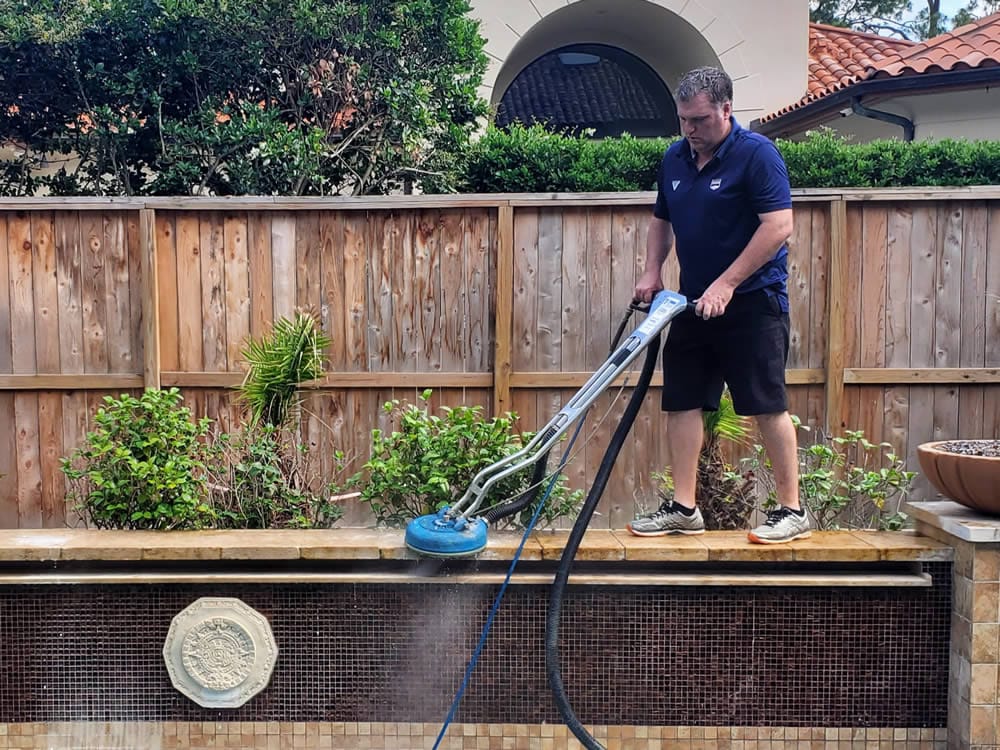
Summer Treatments to Keep Your Outdoor Stone Surfaces Looking Great
The vibrant, sunny days of summer are perfect for enjoying your outdoor spaces, whether it’s lounging by the pool, dining al fresco on the patio, or cooking up a storm in your outdoor kitchen. If you have natural stone surfaces in any of these areas, you know that they add a touch of elegance and beauty to your outdoor living spaces. However, the same summer elements that make these activities enjoyable can also pose challenges for maintaining the pristine look of your natural stone. Natural Stone and the Outdoor Environment Natural stone surfaces, such as granite, limestone, slate, or travertine, are popular choices for outdoor areas because of their durability, versatility, and aesthetic appeal. However, these stones are still susceptible to damage from environmental factors such as chlorine from pool water, rain, and fluctuating weather conditions. Proper maintenance is key to preserving their appearance and longevity. The outdoor and indoor natural stone experts at Modern Stone Care in Houston are well-versed in the specific needs of these surfaces, offering tailored services to keep them looking their best throughout the year. The team at Modern Stone Care understands the unique challenges that outdoor and indoor stone surfaces face in Houston’s climate. They provide professional cleaning, sealing, and repair services to protect against environmental damage, ensuring that your natural stone remains a beautiful and durable feature of your property. Whether it’s safeguarding poolside stone from chlorine or protecting patio stone from heavy rain, the experts at Modern Stone Care have the knowledge and experience to maintain and enhance the beauty of your natural stone surfaces. Chlorine: The Silent Menace to Poolside Stone Poolside stone surfaces are particularly vulnerable to the effects of chlorine. Chlorine, commonly used in pool water for sanitation, is a harsh chemical that can cause significant damage to natural stone over time. When chlorine comes into contact with stone surfaces, it can cause discoloration and fading. Additionally, chlorine can strip away any protective sealant on the stone, leaving it exposed and vulnerable to other types of damage. To protect your poolside stone from chlorine damage, it’s important to regularly rinse the stone with fresh water to remove any chlorine residue. Sealing the stone with a high-quality sealant can also help to create a barrier against chlorine and other harmful substances. During the summer months, it’s a good idea to inspect the sealant regularly and reapply it if necessary. Rain […]
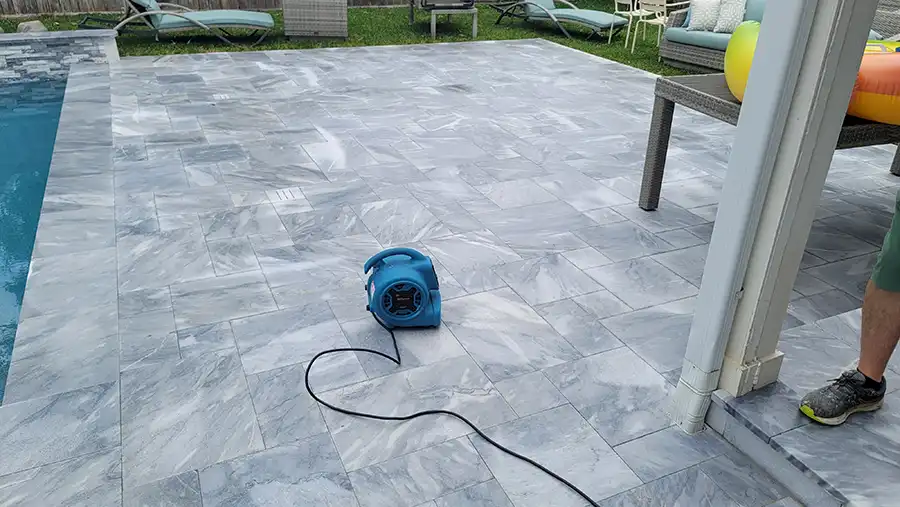
Poolside Natural Stone Cleaning and Maintenance in Houston
If you’re lucky enough to have a swimming pool in Houston, you know that it can be the perfect oasis for escaping the heat, entertaining friends, and relaxing with family. However, maintaining a poolside area with natural stone can be quite challenging. At Modern Stone Care, we specialize in cleaning and maintaining natural stone surfaces both indoors and outdoors. Our team of experts is equipped with the knowledge and tools necessary to keep your poolside stone looking its best year-round. Understanding the Unique Challenges of Poolside Stone Natural stone brings an element of luxury and elegance to any poolside area. Whether you have flagstone, travertine, slate, limestone, or another type of stone, each material has its unique characteristics and challenges. Exposure to the elements, constant foot traffic, pool chemicals, and outdoor debris can take a toll on these surfaces, leading to wear and tear, staining, and other damage. Pool Chemicals One of the most significant threats to poolside natural stone is pool chemicals. Chlorine, bromine, and other pool chemicals can react with the stone, causing discoloration or even deterioration. These chemicals can also lead to efflorescence, a white powdery residue that forms on the stone surface due to the migration of salts. Moisture and Weather Conditions Houston’s weather is another factor that affects poolside natural stone. Humidity, rain, and temperature fluctuations can cause the stone to expand and contract, leading to cracks and other structural issues. Moisture also contributes to the growth of mold, mildew, and algae, which can create slippery conditions and affect the stone’s appearance. Foot Traffic and Outdoor Debris Heavy foot traffic around the pool area can lead to wear and tear on the stone. Sand, dirt, and other debris from outside can also scratch the surface. Over time, this can make the stone look dull and unattractive. Our Approach to Poolside Natural Stone Cleaning and Maintenance At Modern Stone Care, we have extensive experience working with a variety of natural stone types in both indoor and outdoor settings. Our approach to poolside natural stone cleaning and maintenance involves several key steps: 1. Assessment and Inspection Our process begins with a thorough assessment of your poolside area. We examine the stone type, condition, and any existing damage. This step allows us to tailor our cleaning and maintenance plan to your specific needs, ensuring that we address any issues effectively. 2. Deep Cleaning Deep cleaning is essential for […]
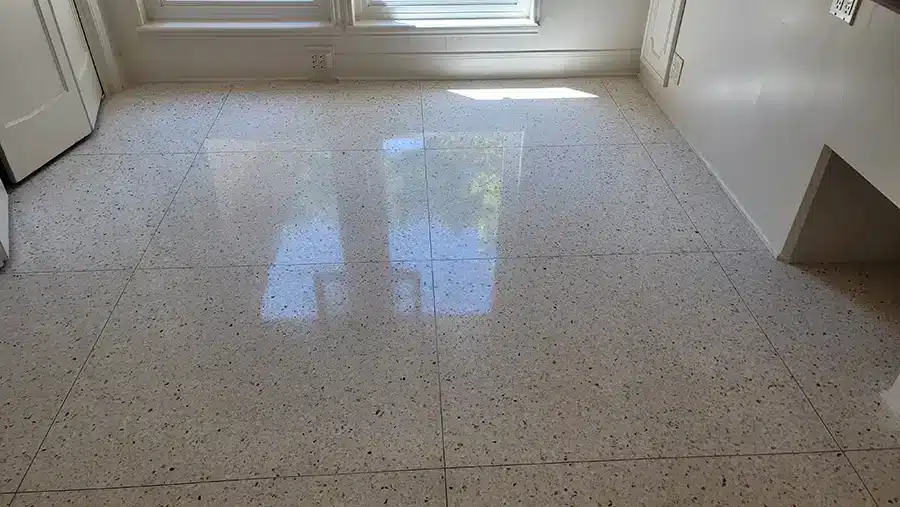
Houston’s Premier Stone Care Services Transform Your Surfaces
Welcome to Modern Stone Care, Houston’s leading experts in stone restoration and maintenance. If you’re a homeowner or a business owner in Houston seeking professional stone services for your residential or commercial floors, kitchen countertops, bathrooms, or other stone surfaces, you’ve come to the right place. Experience Excellence in Stone Care In a bustling city like Houston, your stone surfaces make a statement about your home or business. Whether it’s a marble kitchen countertop, granite bathroom floor, or a travertine office lobby, these surfaces set the tone for your space. At Modern Stone Care, we understand the importance of keeping your stone surfaces looking their best. With our comprehensive range of services, we can transform your dull, worn-out stone into a stunning, polished work of art. The Value of Professional Stone Services The Value of Professional Stone Services Stone is one of the most luxurious and enduring materials used in homes and commercial spaces, known for its beauty and resilience. However, it requires a unique set of skills and knowledge to maintain its charm over time. Here’s a deeper look at why choosing professional stone services is crucial for your floors, countertops, and other stone surfaces: Expert Knowledge and Techniques Professional stone care requires more than just cleaning and polishing. It involves understanding the nuances of various stone types—like marble, granite, travertine, limestone, and slate—and knowing the best techniques for restoring and preserving them. Our team at Modern Stone Care consists of highly trained technicians with years of experience. They know the exact approach to take for each type of stone, whether it’s honed, polished, or textured. Our experts are also up-to-date with the latest advancements in stone care technology and use specialized equipment to ensure optimal results. This expertise ensures that we can handle any stone-related problem, from minor scratches and etches to significant restoration projects. The wrong treatment can permanently damage stone, but with our professionals, you can be sure your surfaces are in the best hands. Time and Cost-Efficiency While DIY stone care might seem appealing, it often leads to more problems than it solves. Without professional experience, you risk using the wrong products or techniques, causing damage that could be expensive to repair. Plus, the time investment can be significant, especially if you’re unfamiliar with the process. When you hire professional stone services, you gain the benefit of speed and efficiency. Our team can complete tasks […]
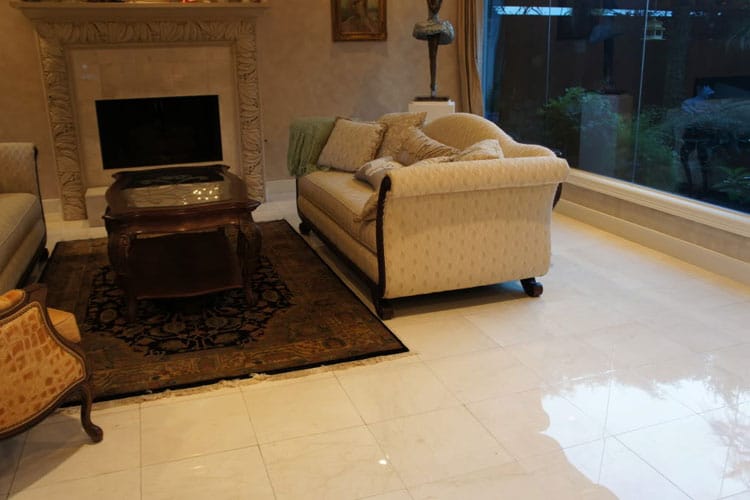
The Ultimate Guide to Caring for Marble Floors in Your Business
Marble flooring is a popular choice for businesses seeking a touch of elegance and sophistication. Its unique veining and luxurious appearance make it a desirable option for creating a polished aesthetic. However, maintaining marble floors requires a special approach to ensure they remain pristine and undamaged over time. This guide provides everything you need to know to keep your marble floors looking great in your business, from regular maintenance to damage prevention and restoration. Understanding Marble: The Basics Marble, renowned for its exquisite patterns and luxurious sheen, has been a favorite material for flooring and other decorative uses for centuries. At its core, marble is a metamorphic rock, formed when limestone is subjected to heat and pressure over a long period. This process causes the calcite in the limestone to recrystallize, resulting in the beautiful and unique patterns that marble is known for. The transformation from limestone to marble imparts certain qualities to the stone that make it both attractive and vulnerable. Here’s a closer look at what makes marble unique and the characteristics that require careful attention: Porosity Marble’s porosity is one of its defining features. The degree of porosity varies between different types of marble, but generally, marble is quite porous. This means it has tiny pores or holes that can absorb liquids and, consequently, stains. If a substance like coffee, wine, or oil spills onto unsealed marble, it can seep into these pores, leaving a permanent mark. Therefore, sealing is an essential step in marble maintenance, ensuring these pores are filled to reduce the risk of staining. Sensitivity to Acids Another key characteristic of marble is its sensitivity to acids. This is due to its calcite content, which reacts with acidic substances to produce a chemical reaction known as etching. When marble comes into contact with common acidic substances—like citrus juice, vinegar, or some cleaning products—the acid breaks down the calcite, leaving behind dull spots or etch marks. These etches can vary in severity from minor surface dullness to deep marks that require professional restoration. Softness Compared to other natural stones like granite, marble is relatively soft. This softness makes it easier to work with and shape into intricate designs, contributing to its widespread use in art and architecture. However, it also means that marble is more prone to scratches and abrasions. Even a small particle of dirt or sand on the bottom of a shoe can […]
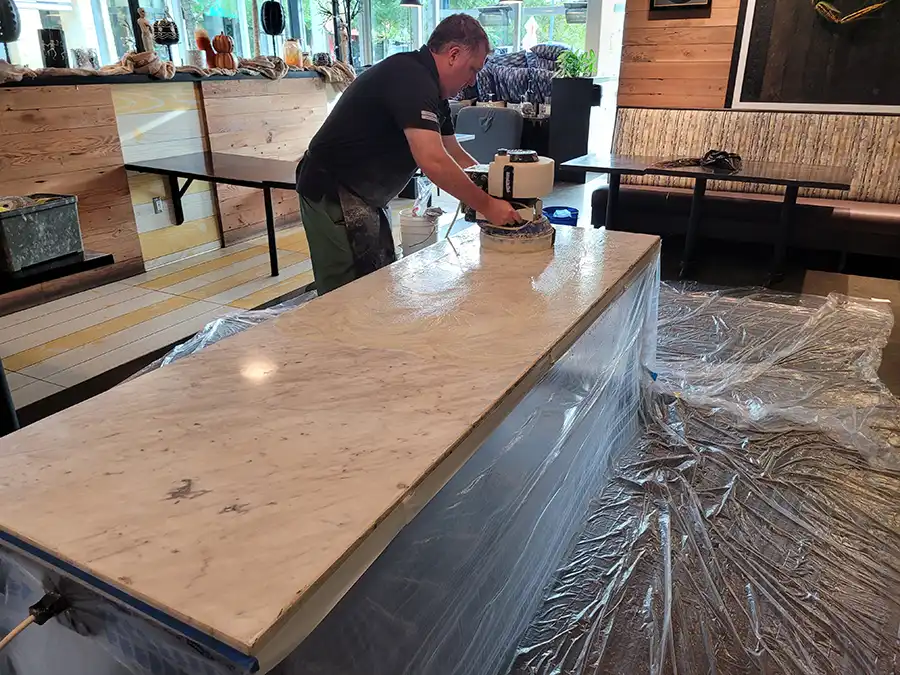
The Ultimate Guide to Choosing and Maintaining Natural Stone Countertops
When redesigning a kitchen, choosing the right countertop can make a significant impact on the look and functionality of one of the most important rooms in your home. Natural stone countertops not only provide unique beauty and durability but also add value to your property. Based in Houston, Modern Stone Care specializes in the maintenance of natural stone surfaces. In this comprehensive guide, we’ll explore the different types of natural stone countertops available, their benefits, and the maintenance required to keep them in pristine condition. 1. Types of Natural Stone Countertops Natural stone comes in various types, each with unique characteristics and aesthetic appeal. Here are the most popular options for kitchen countertops: Granite: Granite stands as a leading choice for kitchen countertops, favored for its remarkable durability and aesthetic variety. Available in numerous colors and patterns, it seamlessly complements various kitchen designs. This natural stone is notably resistant to heat, scratches, and stains, provided it is properly sealed. The resilience of granite makes it an ideal surface for high-traffic kitchens, ensuring longevity and enduring beauty. Its popularity stems not only from its functional attributes but also from its ability to enhance the overall value of a home. Marble: Marble is synonymous with luxury, prized for its elegant veins and sophisticated appearance. It has a special standing in high-end kitchen designs, though it is slightly less durable than granite. Marble surfaces are vulnerable to scratches and can suffer etching from acidic substances, requiring careful use and maintenance. Despite these sensitivities, many homeowners choose marble for its unmatched natural beauty and the upscale ambiance it brings to any space. Its cool temperature also makes it perfect for baking and pastry stations. Quartzite: Quartzite offers a wonderful balance of beauty and resilience, making it an excellent choice for those who admire the appearance of marble but require the durability of granite. This hard, metamorphic rock resists scratching and etching more effectively than marble, standing up well to kitchen abuses. Quartzite’s striking aesthetic, similar to marble, and its robust nature, akin to granite, provide a practical yet beautiful countertop solution. It’s particularly suitable for homeowners looking for long-lasting quality without compromising on style. Limestone: Limestone countertops deliver a warm, natural look that can make any kitchen feel more inviting. Characterized by its soft tones and consistent color, limestone offers an earthy aesthetic that complements a variety of kitchen styles. However, it is less […]

What Causes Grout Staining and Can It Be Reversed?
Grout staining is a common challenge that many homeowners and business owners face, particularly in areas that experience high foot traffic or are frequently exposed to water and other liquids. The porous nature of grout makes it susceptible to absorbing a wide range of substances, leading to unsightly stains that can detract from the overall appearance of your tile flooring or wall installations. Understanding the causes of these stains is the first step towards effectively addressing and reversing the damage. The Common Culprits Behind Grout Staining 1. Dirt and Grime Accumulation The most frequent cause of grout staining is the relentless accumulation of dirt and grime over time. This problem is particularly pronounced in areas subjected to heavy foot traffic, such as entryways, hallways, and commercial spaces. As people come and go, their shoes act as carriers for all sorts of debris, including dirt, sand, and small stones. Each step can press these particles into the grout, gradually embedding them deep within its porous surface. The situation is exacerbated in environments where cleaning is sporadic or insufficient, allowing the grout to darken and lose its original color. Regular foot traffic does not distribute dirt evenly, leading to inconsistent staining that can make floors look patchy and unkempt. 2. Spills and Splashes Kitchens, bathrooms, and dining areas, known for their susceptibility to spills, are notorious for grout staining challenges. These spills can range from water and beverages to more problematic substances like oils, sauces, and acidic liquids (such as vinegar or lemon juice). Each type of spill poses a unique threat to grout. Beverages and oily substances can leave behind colored stains, while acidic solutions may etch into the grout, breaking down its structure and making it even more vulnerable to further staining. The absorbent nature of grout means that quick clean-up is essential to prevent stains, but even prompt action may not be enough to avert the seeping of substances into the grout lines, setting the stage for stubborn stains that defy ordinary cleaning efforts. 3. Mold and Mildew Dampness is a breeding ground for mold and mildew, which thrive in moist environments such as showers, around sinks, and in any areas where water tends to accumulate. These fungi find a hospitable home in the porous matrix of grout, where they can anchor themselves firmly. Over time, mold and mildew growth can lead to extensive staining, characterized by unsightly dark, […]

Professional Stone Cleaning Services for Businesses in Houston
Natural stone flooring and surfaces have long been celebrated for their elegance and robustness, offering a timeless aesthetic appeal that can significantly elevate the appearance of any business setting. From luxurious marble to sturdy granite, these natural materials can create an ambiance of sophistication and professionalism in offices, retail stores, hotels, and other commercial spaces across Houston. However, despite their durability, these beautiful surfaces are not immune to the wear and tear of daily business operations. High foot traffic, accidental spills, and other unavoidable influences can leave your floors looking dull, stained, or even damaged. Recognizing these challenges, it becomes clear why professional stone cleaning services are not just a luxury but a necessity for businesses in Houston aiming to maintain their premises in top condition. The Beauty and Challenge of Natural Stone Natural stone surfaces, with their unique patterns and colors, can add significant value and character to your business. Each type of stone, be it marble, granite, limestone, or slate, comes with its own set of characteristics and offers a different visual appeal. However, the porous nature of many stones makes them susceptible to staining from spills of coffee, wine, oil, and other substances common in a bustling business environment. Additionally, heavy foot traffic can lead to the accumulation of dirt and grime, while the dragging of furniture and equipment can cause scratches and scuffs. Why Professional Stone Cleaning Is Essential In the world of business, first impressions are invaluable. The physical appearance of your premises plays a crucial role in shaping these impressions, and natural stone surfaces are a significant investment towards this end. However, the real challenge lies in maintaining their pristine appearance amidst the relentless wear and tear of daily operations. This is where the indispensable role of professional stone cleaning and maintenance comes to the forefront. It’s not merely about preserving aesthetics; it speaks volumes about your business’s professionalism, attention to detail, and commitment to quality. Let’s delve deeper into the critical importance of professional stone care and the multifaceted benefits it brings. Deep Cleaning: The Foundation of Stone Care Professional stone cleaning is an intricate process that transcends ordinary cleaning methods. It involves the removal of dirt, grime, and bacteria that can stealthily accumulate in the microscopic pores of natural stone. This accumulation isn’t just an aesthetic issue; it can lead to the degradation and erosion of the stone over time. Professionals utilize […]
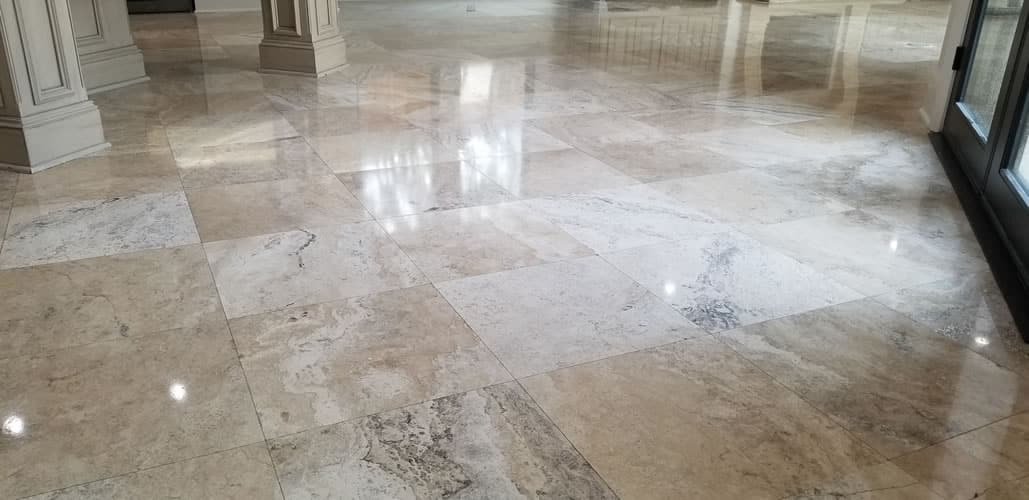
The Ultimate Guide to Caring for Your Natural Stone Surfaces
In the bustling city of Houston, where the architecture blends modern sophistication with classic elegance, the use of natural stone in homes and businesses stands as a testament to timeless beauty and enduring quality. From opulent marble countertops to stately granite floors, and serene limestone showers, natural stone brings a piece of the earth’s intrinsic charm into our spaces. However, to maintain its splendor, understanding the essentials of natural stone care is paramount. In this guide, we will delve into the fundamental practices necessary for preserving the integrity and aesthetic appeal of your stone surfaces. Understanding Natural Stone Understanding the intricacies of natural stone is essential for ensuring its longevity and beauty in your space. Natural stone, a cornerstone of architectural and design projects, offers unmatched aesthetic appeal and durability. However, its care demands a nuanced understanding due to its natural variation and sensitivity. Natural stones fall into two primary categories, each with distinct characteristics and care needs. Calcareous stones, such as marble and limestone, are rich in calcium carbonate. This composition renders them particularly vulnerable to etching and damage from acidic substances, making them beautiful yet delicate choices for interiors. On the other hand, siliceous stones like granite and slate boast a composition that makes them inherently more robust and acid-resistant. These stones offer a hardy solution for areas expecting high use or exposure to acidic foods and substances. The distinction between these stone types is crucial as it dictates the specific care and maintenance protocols required. A one-size-fits-all approach falls short in addressing the unique needs of each stone type. For instance, while a mild, pH-neutral cleaner might be universally recommended, the frequency of sealing, type of sealant used, and specific precautions against staining and etching vary significantly. Understanding your stone’s specific type and characteristics is the foundational step in crafting an effective care regimen. This knowledge enables the selection of appropriate cleaning agents, the implementation of protective measures, and the identification of professional care when necessary, ensuring that the natural beauty and integrity of the stone are preserved for years to come. Daily Maintenance: Keeping Your Stone Surfaces Pristine Cleaning: The cornerstone of natural stone care is regular cleaning. For daily maintenance, wiping surfaces with a soft, damp cloth can remove most dust and debris. However, for a deeper clean, use a pH-neutral cleaner specifically designed for natural stone. Avoid acidic cleaners, including vinegar or lemon-based solutions, […]
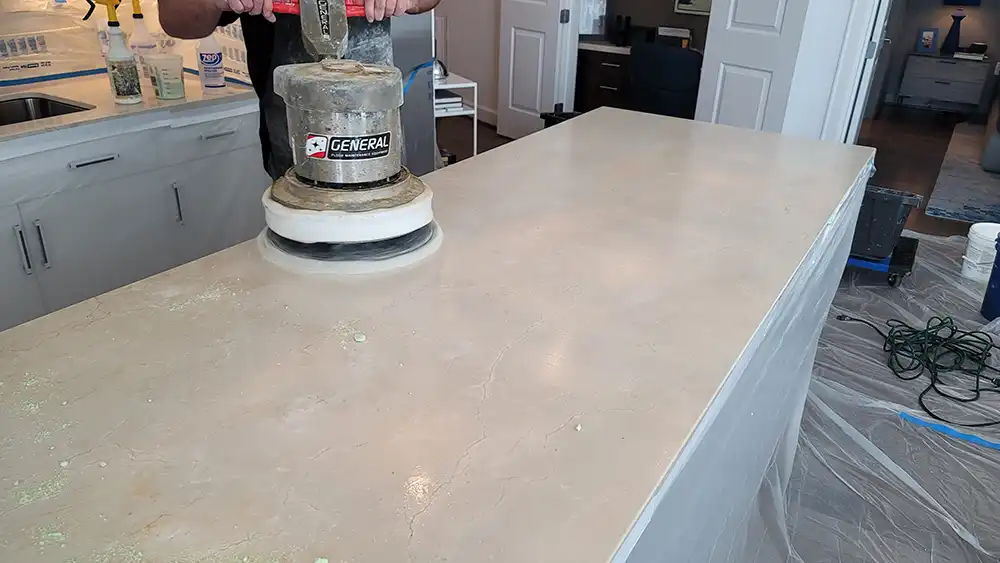
Modern Stone Care Your Partner for Natural Stone Maintenance in Houston
In the heart of Houston, a city known for its vibrant culture and historic architecture, maintaining the integrity and beauty of natural stone installations is paramount for both homeowners and business owners alike. Natural stone, with its unparalleled elegance and durability, plays a pivotal role in adding value and character to any space. However, preserving its pristine condition requires expertise, precision, and a deep understanding of the material’s unique properties. This is where Modern Stone Care shines as the premier natural stone maintenance technicians in Houston, setting the standard for excellence in the industry. Unmatched Expertise in Natural Stone Care Modern Stone Care distinguishes itself within the competitive Houston market through its unparalleled expertise in natural stone care, spanning a variety of types such as marble, granite, limestone, travertine, and more. This deep-seated knowledge goes far beyond mere familiarity with the material. It encompasses a comprehensive understanding of the specific requirements needed to maintain each type of stone at its peak condition, ensuring its longevity and enhancing its aesthetic appeal. The technicians at Modern Stone Care are not just workers; they are artisans and experts who undergo continuous, rigorous training. This education allows them to stay at the forefront of the latest techniques and advancements in stone care technology. As a result, they are adept at offering customized solutions that not only safeguard your valuable investment but also elevate the natural beauty of your stone installations. Their proficiency is evident in their ability to diagnose and treat common and uncommon stone issues, applying both time-honored methods and cutting-edge technologies to ensure the best possible outcome. Whether it involves the precise art of matching stone textures and colors for seamless repair jobs or employing specially formulated treatments to enhance the stone’s resilience against wear and tear, Modern Stone Care’s team tackles each challenge with unmatched skill and dedication. A Comprehensive Range of Services At Modern Stone Care, the breadth of services offered is designed to comprehensively cover every possible need your natural stone might have. From rejuvenating the gloss of a cherished marble hallway to performing intricate upkeep on granite countertops, their extensive service roster is all-encompassing. Services extend beyond deep cleaning, polishing, sealing, and the mending of chips and cracks, to include grout repair, color enhancing, and slip resistance treatments. This vast spectrum of services ensures that Modern Stone Care is fully equipped to handle any maintenance requirement your natural […]
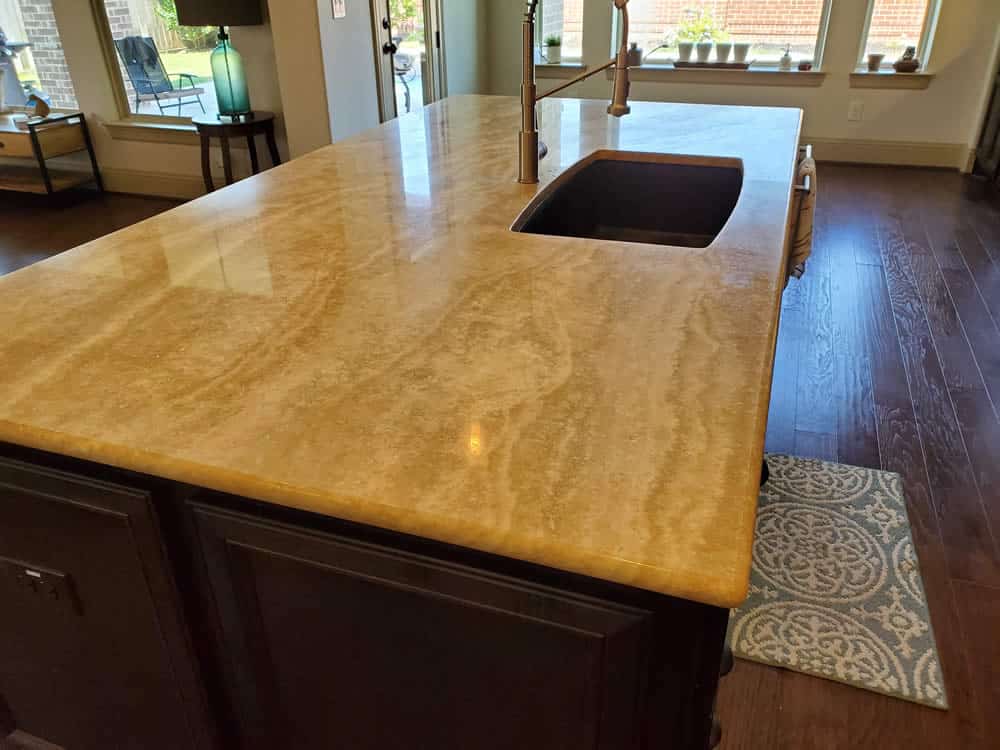
The Importance of Routine Professional Maintenance for Natural Stone Surfaces
In the vibrant heart of Houston, where the blending of urban chic meets Southern charm, homeowners and businesses alike pride themselves on their aesthetic choices, particularly when it comes to natural stone countertops and flooring. Natural stone, with its timeless elegance, provides not only a touch of nature’s beauty but also an aura of sophistication and durability to any space. However, as with all precious investments, maintaining the pristine condition of these surfaces is paramount. It’s here that the significance of routine professional maintenance becomes undeniable. A Shield Against the Elements Natural stone, though sturdy, is not invincible. It’s a living material that interacts with its environment. In Houston’s humid climate, stone surfaces are constantly under siege by the elements. Without proper care, this can lead to a myriad of issues, including erosion, staining, and a dulling of the stone’s natural luster. Routine professional maintenance acts as a shield, protecting these surfaces from the harshness of their surroundings. It’s not just about maintaining appearances; it’s about preserving the stone’s integrity against weathering and wear. The Battle Against Everyday Damage Daily life is full of little moments that can lead to big problems for natural stone surfaces. Spills, accidents, and even the simple act of walking across a stone floor can leave marks on these beautiful surfaces. Over time, without proper care, these small damages can accumulate, leading to a surface that looks worn and neglected. Professional maintenance provides a consistent level of care that tackles these issues head-on, ensuring that your stone surfaces remain as immaculate as the day they were installed. Enhancing Beauty and Longevity One of the most compelling reasons to invest in routine professional maintenance for your stone surfaces is the undeniable benefit it offers in terms of aesthetic appeal and longevity. Natural stone, when well-cared-for, has a luminous quality that is unparalleled. Regular maintenance by professionals who understand the unique needs of different types of stone can enhance this natural beauty, bringing out the colors and patterns inherent in the material. Furthermore, this routine care can significantly extend the life of your stone surfaces, ensuring that they remain a lasting investment in your home or business. The Cost of Neglect Neglecting the care of natural stone surfaces can lead to irreversible damage. Stains can become deeply set, cracks can widen and become more pronounced, and the surface can become rough and unsightly. The cost of restoring […]
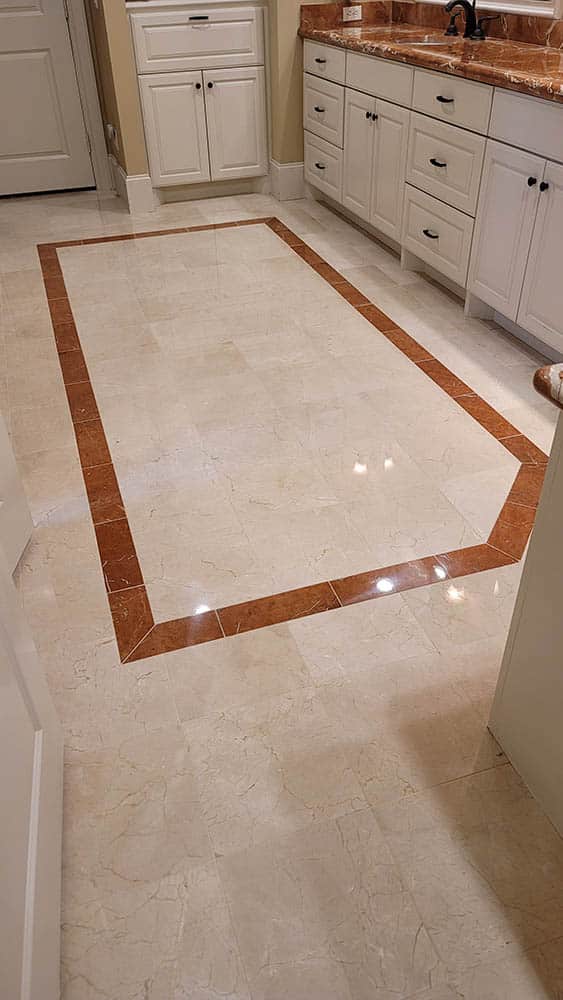
Expert Stone Restoration Services in Houston
Modern Stone Care is Houston’s premier destination for natural stone maintenance, where preserving the timeless beauty of your stone surfaces is not just our job—it’s our passion. Home and business owners alike trust us to breathe new life into their damaged or neglected stone floors, countertops, and backsplashes, reaffirming our position as the city’s leading experts in stone restoration. Why Choose Natural Stone? Natural stone is not just a material choice; it’s a statement of elegance and a commitment to enduring quality. Beyond the immediate visual appeal of marble’s sophisticated patterns and granite’s robust texture, natural stone encompasses a wide array of materials, including slate, limestone, and travertine, each bringing its unique warmth and natural beauty to the environments they grace. This diversity allows for unparalleled customization, enabling homeowners and businesses alike to craft spaces that truly reflect their identity and aspirations. Moreover, natural stone’s longevity and resilience to the passage of time offer a sustainable investment. When treated with the respect and care it deserves, natural stone can withstand decades of use, evolving into a living testament to the spaces’ histories and the lives that unfold within them. This enduring nature, coupled with the stone’s inherent value, contributes significantly to the property’s overall worth, enhancing its aesthetic and monetary value in equal measure. However, the true essence and potential of these surfaces are fully realized only when paired with meticulous care and maintenance. Modern Stone Care’s dedication to preserving the innate beauty of natural stone surfaces is reflected in our comprehensive approach, ensuring these investments continue to flourish and impress for generations. The Importance of Professional Stone Care The journey of natural stone from the earth to your space is a testament to its resilience, yet its beauty is perpetually at risk from everyday wear and tear. Improper cleaning agents, accidental spills, and environmental factors can all compromise its integrity, leading to etching, staining, and physical damage. These afflictions not only detract from the stone’s beauty but can also diminish its value, both aesthetically and financially. This vulnerability underscores the critical importance of professional stone care. Entrusting your stone surfaces to the experts at Modern Stone Care means more than just routine maintenance; it’s an investment in the longevity and beauty of your property. Our team employs a combination of traditional craftsmanship and modern technology to address each stone’s specific needs, ensuring that its natural beauty is not only […]
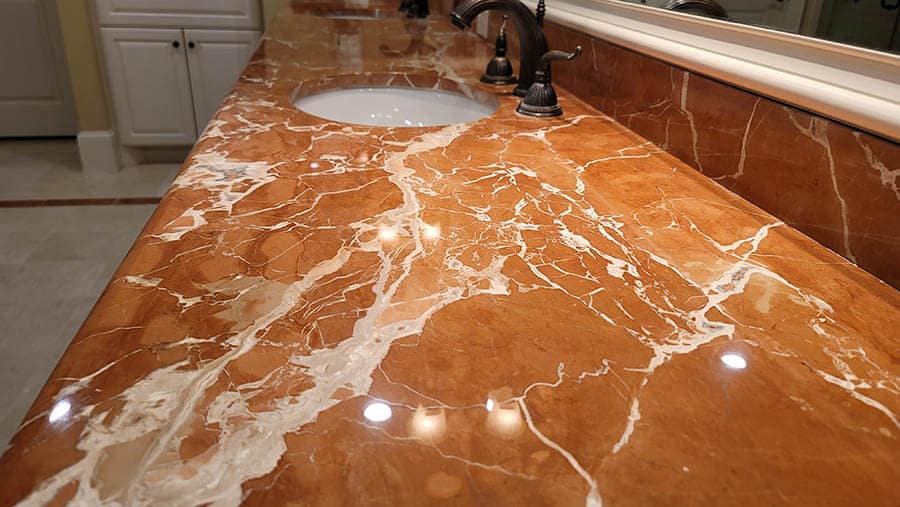
Revitalizing Your Home with Modern Stone Care in Houston
In the heart of Houston, where the hustle and bustle meet serene residential areas, homeowners and business owners alike strive to maintain the beauty and integrity of their properties. Among the myriad ways to enhance the aesthetic appeal and durability of your space, investing in professional stone care stands out as a pivotal choice. Modern Stone Care in Houston emerges as a beacon of excellence in this domain, offering unparalleled services to revitalize and protect your stone surfaces. This post delves into the essence of stone care, the offerings of Modern Stone Care, and why it’s a critical investment for your property. The Importance of Professional Stone Care Natural stone surfaces, known for their timeless elegance and durability, grace many homes and commercial spaces in Houston and beyond, offering a touch of nature’s beauty and sophistication. From the majestic swirls of marble to the rugged essence of granite, the earthy tones of limestone to the subtle elegance of travertine, natural stone presents a diversity in texture, color, and appeal that can complement any design aesthetic. However, the enduring beauty and structural integrity of these stone surfaces rely heavily on meticulous care and maintenance. This comprehensive guide underscores the critical importance of professional stone care, detailing the myriad benefits it offers in preserving the natural charm and longevity of stone installations. Preserving Natural Aesthetics Natural stone, while inherently sturdy and appealing, is not immune to the ravages of time and daily life. Regular foot traffic, accidental spills, and even the inadvertent use of harsh cleaning agents can tarnish the pristine appearance of stone surfaces. Scratches, etching, or stains can quickly mar their beauty, leaving them dull and lifeless. This is where professional stone care steps in as a guardian of your stone’s aesthetics. Through a combination of specialized cleaning, meticulous polishing, and the application of protective sealants, professional stone care experts like those at Modern Stone Care in Houston ensure that your stone retains its original splendor and shine. These tailored services not only rejuvenate the stone’s appearance but also protect it against future damage, ensuring that the stone’s natural beauty is preserved for years to come. Enhancing Durability and Longevity The resilience of natural stone is one of its most lauded qualities, yet without proper care, even the toughest stone can succumb to wear and tear. High-traffic areas are particularly vulnerable, where the constant tread of feet can lead to […]
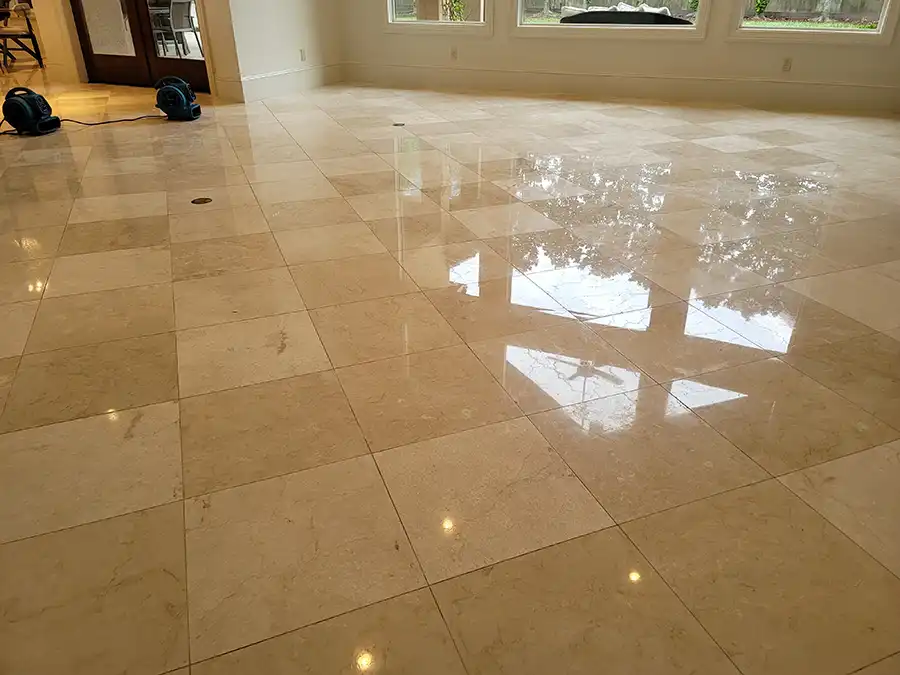
Everything You Need to Know About Tile and Grout Cleaning
Tiles and grout are not only fundamental to the structural integrity and aesthetic appeal of residential and commercial spaces but also play a significant role in the overall environment and health of those areas. Despite their importance, the maintenance of tiles and grout is often overlooked, leading to a buildup of bacteria, germs, and unsightly stains that can compromise the beauty and safety of your space. This expanded guide delves deeper into the complexities of tile and grout maintenance, underscores the critical nature of professional cleaning, and highlights how Modern Stone Care in Houston emerges as a beacon of trust for homeowners and business owners seeking to maintain pristine and healthful surfaces. Understanding the Vital Role of Tiles and Grout Tiles are celebrated for their strength, resilience, and wide range of designs, making them a favored choice for enhancing the floors, bathrooms, and kitchen areas. Grout fills the gaps between tiles, providing not just aesthetic uniformity but also reinforcing the tiles’ placement and acting as a barrier against moisture penetration. Yet, beneath this sturdy exterior lies a vulnerable aspect – the grout’s porous composition, which becomes a clandestine haven for microorganisms. The Perils Lurking in Porous Grout Grout’s porous nature is a double-edged sword; it’s essential for the application process but also makes grout a magnet for moisture, dirt, and spills. This absorption capability turns grout into fertile ground for bacteria and mold proliferation. In areas with high humidity levels, such as Houston, the risk is significantly magnified, leading to potential indoor air quality degradation and health hazards. Spaces frequently exposed to water and organic substances, like kitchens and bathrooms, are especially at risk, underscoring the need for vigilant maintenance. The Stain Dilemma: More Than Just an Eyesore As time marches on, grout lines may fall victim to discoloration and stubborn stains, marring the visual harmony of tile installations. Far from being mere cosmetic concerns, these stains often signal underlying problems, including mold infestation or ingrained dirt, which defy ordinary cleaning attempts. The challenge is not only aesthetic but also health-related, as these conditions can lead to compromised indoor environments. Elevating Cleaning with Modern Stone Care’s Expertise Acknowledging the myriad challenges faced in preserving the integrity and appearance of tile and grout, Modern Stone Care in Houston distinguishes itself through superior cleaning and stain removal services. Their approach transcends conventional cleaning, offering a scientifically backed and comprehensive strategy to combat […]
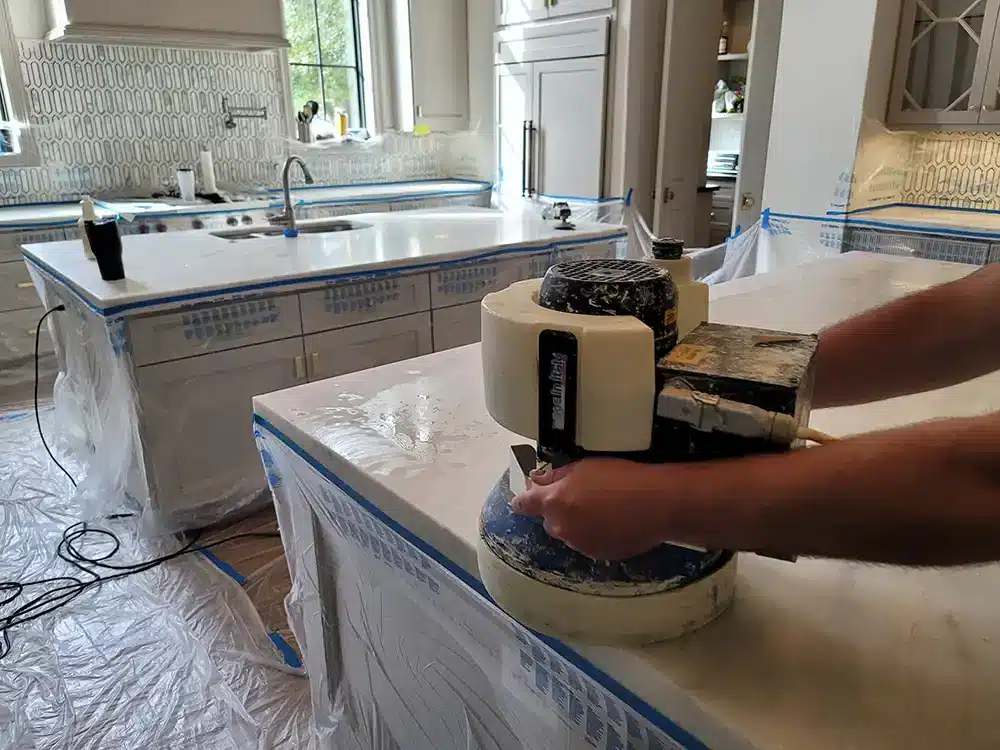
Unlocking the Beauty and Longevity of Natural Stone Expert Care in Houston
Natural stone surfaces exude timeless elegance and beauty that can transform any space into a work of art. Whether it’s granite, marble, limestone, or travertine, these stones have been prized for centuries for their unique textures, patterns, and durability. If you’re a proud owner of natural stone in your home or business in Houston, you already understand the value it brings to your space. However, to maintain its beauty and protect it from vulnerabilities, it’s essential to understand what natural stone is, its vulnerabilities, and how to care for it properly. In this comprehensive guide, we will delve into the world of natural stone care, explaining what natural stone is, its vulnerabilities, and how you can avoid unsightly marks while preserving its beauty through professional services like cleaning, polishing, and sealing provided by Modern Stone Care in Houston. Understanding Natural Stone Natural stone is a remarkable product of nature’s geological processes, formed deep within the Earth’s crust over millions of years. It is extracted from quarries and cut into slabs or tiles for use in various applications, such as countertops, floors, walls, and even sculptures. The most common types of natural stone used in residential and commercial settings include granite, marble, limestone, travertine, and slate, each offering distinct aesthetics and characteristics. Granite: Known for its exceptional hardness and resistance to heat and scratches, granite is a popular choice for countertops and flooring. It features a wide range of colors and patterns, making it suitable for various design styles. Marble: Marble is renowned for its timeless beauty and luxurious appearance. It is often used for countertops, fireplace surrounds, and flooring. However, it is relatively softer than granite, making it more susceptible to etching and staining. Limestone: Limestone has a softer, more porous nature compared to granite or marble, which makes it prone to scratches, chips, and stains. It is commonly used for fireplace surrounds, flooring, and outdoor paving. Travertine: Travertine boasts a unique, porous texture and is commonly used in outdoor applications like patios and pool decks. Its distinctive look makes it a favorite among homeowners seeking a rustic, natural feel. Slate: Slate is characterized by its layered appearance and is often used for roofing, outdoor flooring, and countertops. It is durable and slip-resistant, making it ideal for wet areas. Despite their inherent beauty and durability, natural stone surfaces are not immune to vulnerabilities that can lead to deterioration over time. […]
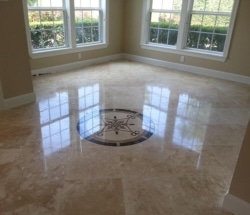
Preserve the Beauty of Your Natural Stone Surfaces in Houston
Natural stone surfaces, with their timeless elegance and durability, are a popular choice in many homes and commercial spaces. They bring a piece of nature’s magnificence into our daily environments, but they also require special care to maintain their beauty and longevity. Modern Stone Care, based in Houston, Texas, offers a range of services aimed at preserving and enhancing natural stone surfaces, ensuring that they remain as stunning as the day they were installed. Understanding Natural Stone and Its Importance Natural stone, encompassing materials like marble, granite, limestone, travertine, and slate, is not only renowned for its diverse and unique aesthetic appeal but also for its durability and resilience. These stones are geological marvels, slowly crafted by nature over countless millennia, making each piece distinctly unique in its patterns, colors, and textures. They are more than just visually appealing elements; they imbue significant value and character to properties and spaces. The versatility of natural stone is evident in its wide range of applications. It’s extensively used in various architectural and design contexts, from elegant flooring solutions and robust countertops to decorative wall claddings and serene outdoor landscapes. Its adaptability allows it to fit into various design schemes, from rustic and traditional to modern and minimalist. However, the beauty and functionality of natural stone come with a caveat. Being naturally porous and chemically sensitive, these stones can be susceptible to staining, etching, and other forms of wear. Exposure to certain chemicals, extreme weather conditions, and everyday wear and tear can deteriorate their appearance and structural integrity. The Need for Professional Stone Care Given their vulnerability, regular and meticulous cleaning and maintenance are imperative to protect and preserve these natural stone surfaces. Over time, even with diligent care, natural stone can dull, scratch, and etch, diminishing its natural beauty and elegance. This deterioration is where the expertise of professional stone care services becomes indispensable. Specialists like Modern Stone Care possess the knowledge, skills, and equipment necessary to effectively restore and maintain these natural surfaces, ensuring they retain their original splendor and durability. Services Offered by Modern Stone Care Modern Stone Care recognizes the diverse needs of natural stone surfaces and offers a comprehensive suite of services designed to address these needs effectively. These services include: Deep Cleaning: Stone surfaces, particularly in high-traffic areas, are prone to accumulating dirt, grime, and bacteria over time. This is especially true for grout lines, where contaminants […]
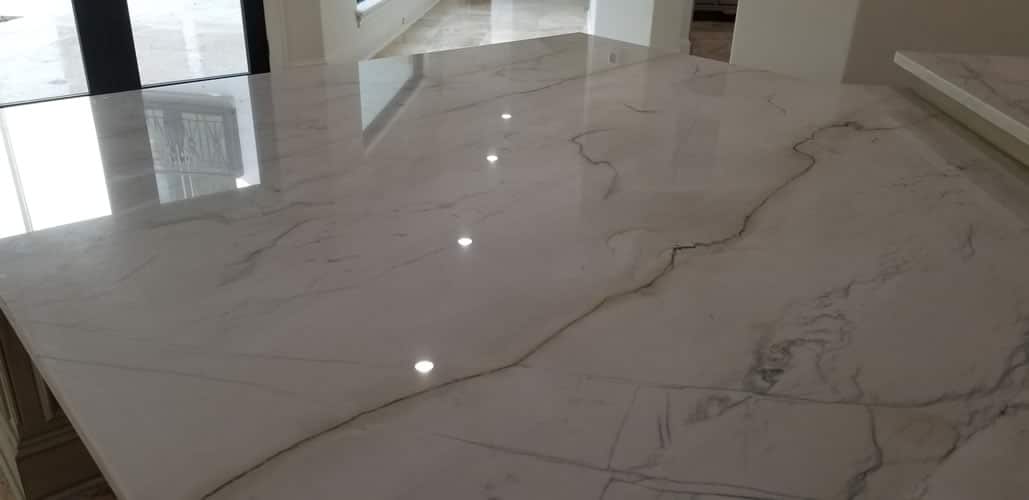
The Ultimate Guide to Natural Stone Care in Houston Cleaning, Polishing, Sealing and Restoration
Welcome to the comprehensive guide designed exclusively for Houston homeowners who are passionate about maintaining the natural beauty and integrity of their stone surfaces. In the world of home décor, natural stone stands out for its ability to add depth, character, and a touch of nature’s artistry to any living space. From the classic sophistication of marble and the durable allure of granite to the warm, inviting textures of travertine and limestone, these materials offer a spectrum of design possibilities. Yet, the true splendor of natural stone lies not just in its initial installation but in its ongoing care and preservation. This is where the challenge lies, as the unique properties of each stone type demand specialized knowledge and handling to maintain their beauty and functionality over time. Enter Modern Stone Care, Houston’s premier destination for all things related to natural stone maintenance. Our mission is to provide homeowners with the insights, services, and support needed to ensure their stone features continue to enhance their homes with their natural beauty. We understand the complexities involved in caring for various types of stone, from preventing etching and staining in softer stones like marble to preserving the high-gloss finish of denser stones like granite. With a team of seasoned professionals equipped with the latest in stone care technology and eco-friendly practices, Modern Stone Care offers a suite of services tailored to address the unique needs of each stone type and the specific environmental factors of the Houston area. Whether you’re looking to revive the shine of worn-out surfaces, protect your stone from the elements, or restore a piece of stone artistry to its former glory, Modern Stone Care is here to guide you through every step of the process, ensuring your stone features remain an enduring testament to your home’s elegance and style. Why Natural Stone Care is Essential Natural stone, renowned for its durability and aesthetic appeal, forms an integral part of modern homes, enhancing their beauty and value. However, its porous nature makes it vulnerable to a variety of environmental and human factors. Everyday activities can inadvertently damage these surfaces; spills can seep into the stone, causing discoloration, while foot traffic can erode its finish, leading to a loss of sheen. Even common cleaning methods, if not correctly applied, can introduce chemicals that degrade the stone’s integrity over time. This not only detracts from the stone’s visual allure by causing […]
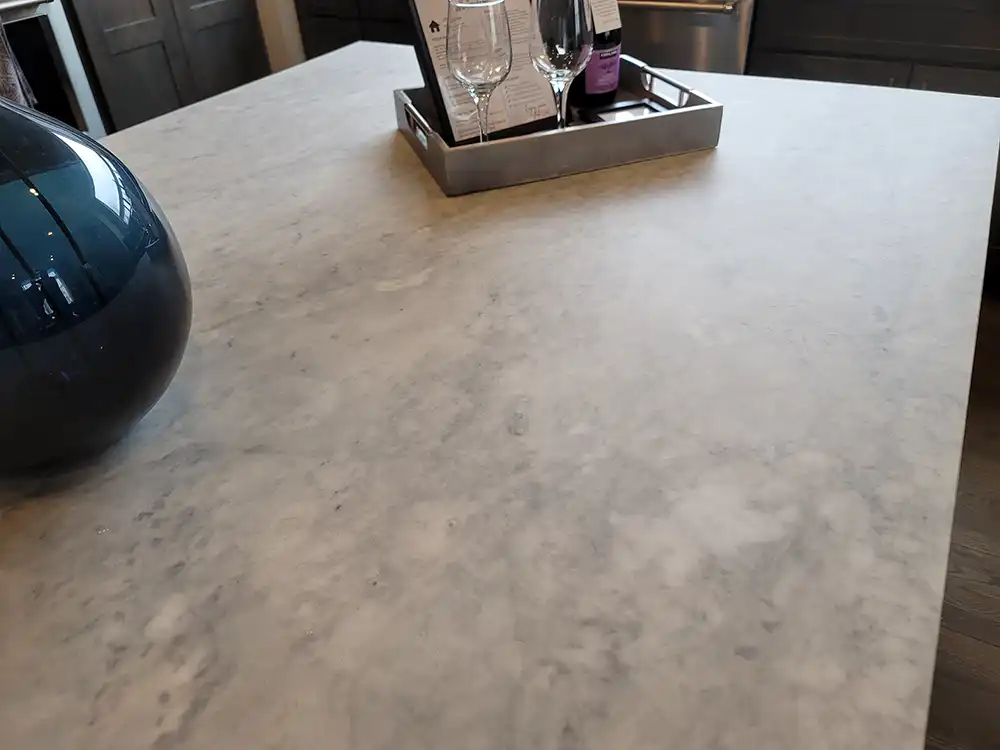
Natural Stone Sealing Services Throughout Houston Area
Natural stone surfaces, with their timeless beauty and durability, have become a popular choice in modern architecture and interior design. From elegant marble countertops to sleek granite floors, these materials add a touch of sophistication to homes and commercial spaces alike. However, to ensure the longevity and pristine appearance of these surfaces, it is crucial to emphasize the importance of natural stone sealing, especially in a city like Houston where the climate can pose unique challenges. Modern Stone Care in Houston understands the significance of preserving the aesthetic appeal and structural integrity of natural stone surfaces. The process of natural stone sealing involves applying a protective layer to the surface to guard against various forms of damage, ensuring that these stunning features withstand the test of time. One of the primary reasons natural stone sealing is indispensable is its ability to repel stains. Houston, known for its vibrant lifestyle and diverse culinary scene, exposes natural stone surfaces to the risk of spills and stains. Without proper sealing, porous stones such as marble and limestone can absorb liquids quickly, leading to stubborn stains that tarnish the surface’s appearance. Modern Stone Care’s sealing process acts as a barrier, preventing liquids from penetrating the stone and making cleanup a breeze. Whether it’s red wine on a marble countertop or oil on a limestone floor, the sealed surface repels these substances, maintaining the stone’s pristine look. In a city with fluctuating weather conditions like Houston, natural stone surfaces are also vulnerable to the damaging effects of moisture. Humidity levels can rise significantly, especially during the hot summer months, making the city’s climate a potential threat to unsealed stones. Natural stone, when exposed to moisture, can suffer from discoloration, mold growth, and even structural damage over time. Modern Stone Care’s sealing process provides a protective shield, preventing moisture from seeping into the stone and causing these detrimental effects. This is particularly crucial for outdoor installations like patios and pool surrounds, where exposure to the elements is constant. Beyond the aesthetic benefits, natural stone sealing contributes to the long-term structural health of the surfaces. Unsealed stone is more susceptible to wear and tear, including scratches and abrasions. Foot traffic, furniture movement, and other daily activities can gradually degrade the surface of the stone. Modern Stone Care’s sealing solution acts as a barrier, reducing the impact of these factors and preserving the stone’s integrity. This is especially […]

The Essential Guide to Professional Natural Stone Care in Houston
Natural stone surfaces, with their timeless elegance and durability, add a touch of sophistication to any home or business in Houston. Whether it’s the opulent beauty of marble, the earthy charm of granite, or the rustic appeal of slate, natural stone creates a lasting impression. However, to ensure that these surfaces retain their splendor for as long as possible, professional care is indispensable. At Modern Stone Care in Houston, we understand the nuances of natural stone and offer a comprehensive range of services to keep your floors and countertops looking pristine. In this blog post, we’ll delve into the importance of professional care, the longevity of natural stone, common types of natural stone, and why reaching out to our team is a wise investment. The Longevity of Natural Stone One of the remarkable aspects of natural stone is its longevity. When properly cared for, these surfaces can endure for centuries, showcasing their innate strength and resilience. Granite, for instance, is renowned for its durability and can last for generations. Marble, although softer than granite, can still withstand the test of time when treated with care. The key to unlocking the full potential of natural stone lies in routine maintenance and professional care. Types of Natural Stone Houston’s vibrant homes and businesses showcase a rich tapestry of natural stone surfaces, each demanding unique care. Delving into the nuances of various stone types is pivotal for effective maintenance. Explore the diverse natural stones prevalent in the region: Granite: A stalwart in durability and heat resistance, granite graces countertops in a myriad of colors and patterns. Its versatility makes it a favorite for both residential and commercial spaces, enduring the rigors of daily use. Marble: Timelessly elegant, marble radiates luxury but demands specialized care due to its susceptibility to etching and scratching. Adored for its aesthetic appeal, marble remains a premium choice for those seeking sophistication. Limestone: Embracing a softer, more porous surface, limestone finds its place in flooring. Regular sealing becomes imperative to thwart stains and stave off deterioration, ensuring a long-lasting charm. Slate: An outdoor champion, slate boasts durability and slip resistance. However, maintaining its natural luster requires meticulous cleaning, preserving its allure amid various weather conditions. Travertine: Sporting a distinctive porous appearance, travertine adorns both flooring and countertops. Sealing becomes a linchpin in protection against stains and etching, safeguarding the unique charm that sets travertine apart. Understanding the characteristics of […]
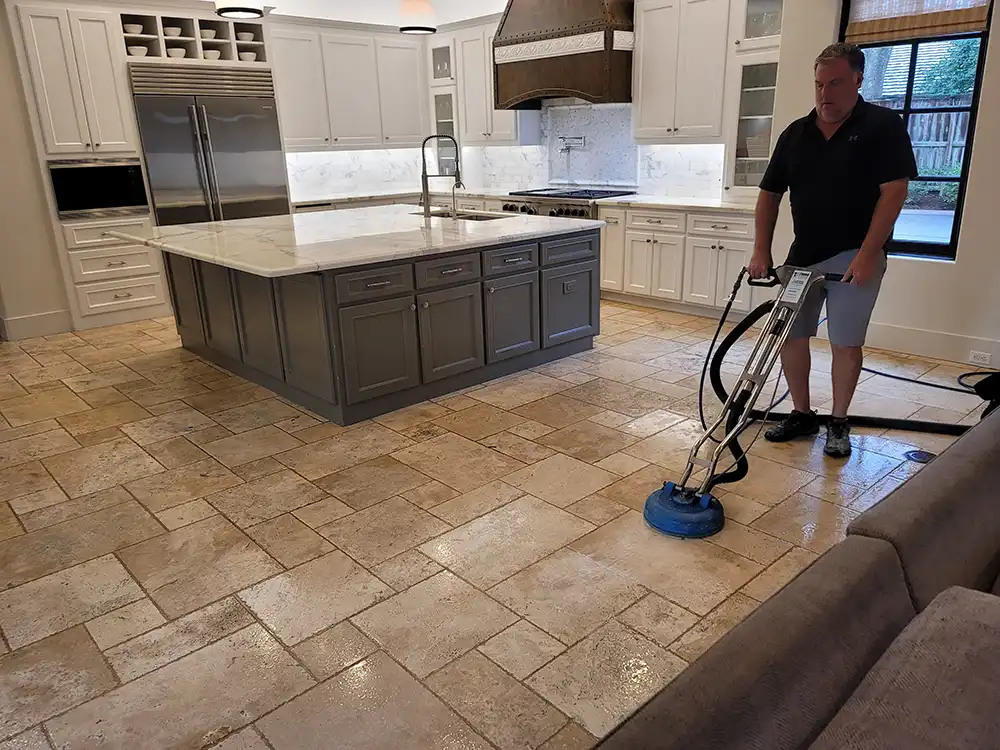
The Comprehensive Guide to Natural Stone Care in Houston Flooring and Countertops
Welcome to Modern Stone Care’s ultimate guide on everything you need to know about natural stone flooring and countertops in Houston. Whether you’re a homeowner, designer, or builder, understanding the ins and outs of caring for your natural stone surfaces is essential for maintaining their beauty and longevity. In this comprehensive post, we’ll delve into topics like polishing stone, professional stone cleaning, sealing natural stone, and more. 1. What is Natural Stone Flooring? Natural stone flooring is an exquisite option for homes, offering timeless elegance and durability. Materials like marble, granite, limestone, and travertine are commonly used. Each type has unique characteristics, so it’s crucial to choose the right one based on your preferences and the specific needs of your space. 2. How to Choose the Right Natural Stone for Your Home? Consider factors such as color, hardness, porosity, and maintenance requirements when selecting natural stone. Granite is known for its durability, while marble exudes luxury. Understanding these differences ensures you make an informed decision that aligns with your lifestyle. 3. Polishing Stone: Unveiling the Natural Brilliance Polishing stone enhances its natural beauty, bringing out its unique patterns and colors. Professional polishing not only restores the shine but also protects the surface from stains and scratches. Regular polishing is essential to keep your stone surfaces looking their best. 4. DIY Stone Polishing: Dos and Don’ts While professional polishing is recommended for optimal results, there are DIY methods for maintaining your stone surfaces. Avoid harsh chemicals and abrasive tools, opting for pH-neutral cleaners and soft cloths. Regular maintenance prevents the need for extensive restoration. 5. Professional Stone Cleaning: Why It Matters Professional stone cleaning goes beyond regular maintenance. Experts use specialized equipment and eco-friendly products to remove deep-seated dirt, stains, and contaminants without causing damage. This ensures a thorough and safe cleaning process. 6. How Often Should You Professionally Clean Your Stone Surfaces? The frequency of professional stone cleaning depends on factors like foot traffic and the type of stone. As a general rule, schedule a professional cleaning at least once a year to maintain the pristine condition of your natural stone. 7. Sealing Natural Stone: The Protective Shield Sealing natural stone is a crucial step in preventing stains and damage. The type of sealer depends on the stone type, so it’s important to consult with professionals to determine the most suitable option for your surfaces. 8. Common Misconceptions About Sealing […]

Marble Countertop Polishing in The Woodlands
In the heart of The Woodlands, where sophistication meets natural beauty, homeowners are choosing marble countertops to grace their kitchens with an air of elegance. The allure of marble lies not only in its aesthetic appeal, with distinctive veining and a palette of timeless colors, but also in its inherent durability. Yet, to ensure the longevity of this luxurious material, proper care is essential. In this blog post, we delve into the realm of marble countertop care, exploring the reasons behind marble’s popularity, the crucial need for sealing, and the intricate processes of polishing. Join us on a journey through the nuances of marble care as we address the pressing questions that every homeowner in The Woodlands may have when it comes to maintaining the timeless beauty of their marble countertops. Why is Marble Good for Countertops? Marble has long been revered for its timeless beauty and luxurious appearance, making it a preferred choice for countertops in upscale homes. The allure of marble lies in its unique veining patterns and a wide array of colors, ranging from classic whites and grays to warmer tones. This natural stone adds a touch of sophistication to any space, elevating the overall aesthetic. One of the key reasons why marble is highly sought after for countertops is its durability. While it is softer than granite, another popular choice, marble is still a robust material that can withstand the rigors of daily use. With proper care, marble countertops can last a lifetime, making them a valuable investment for homeowners. Beyond its aesthetic and durability, marble is also an excellent choice for baking enthusiasts. Its naturally cool surface is ideal for working with pastry and dough, providing a unique benefit for those who enjoy spending time in the kitchen. The reflective properties of marble can also enhance the lighting in the room, creating a bright and inviting atmosphere. In summary, marble is an excellent choice for countertops due to its timeless beauty, durability, and unique functional properties that make it a standout in any kitchen. Does Marble Need to Be Sealed? Yes, marble countertops need to be sealed to protect them from stains, etching, and other forms of damage. Marble is a porous stone, which means that it can absorb liquids and is susceptible to staining. Sealing creates a protective barrier on the surface, preventing substances from penetrating the stone and causing damage. The sealing process […]

Understanding the Nature of Natural Stone Flooring
Natural stone flooring has stood the test of time as a classic choice for homeowners seeking both durability and elegance. From the earthy allure of slate to the timeless beauty of marble, natural stone offers a unique blend of aesthetic appeal and practicality. In this blog post, we aim to unravel the essence of natural stone flooring, shedding light on its composition, cleaning requirements, the importance of sealing, and the nuances of polishing. What is Natural Stone and Why Does it Work as Flooring? Natural stone is a geological marvel, formed over millennia through the intricate interplay of pressure, heat, and minerals. Granite, marble, limestone, slate, and travertine are just a few examples of the diverse array of stones harvested from the Earth. What makes natural stone an ideal flooring choice is its remarkable durability, innate beauty, and the distinct character each type of stone possesses. The enduring popularity of natural stone flooring lies in its ability to merge functionality with aesthetics seamlessly. The hardness of granite renders it resistant to scratches and abrasions, making it ideal for high-traffic areas. Marble, on the other hand, exudes luxury with its polished surface, making it a preferred choice for grand entrances and formal spaces. The variations in color, pattern, and texture among different types of natural stone allow homeowners to tailor their flooring choices to match their unique tastes and the specific needs of each room. How Often Do Natural Stone Floors Need to Be Cleaned? Maintaining the pristine appearance of natural stone floors requires a consistent cleaning regimen. The frequency of cleaning depends on factors such as foot traffic, the type of stone, and the likelihood of spills. In general, a weekly cleaning routine using a pH-neutral cleaner specially formulated for natural stone is recommended. This routine helps prevent the accumulation of dirt and debris, preserving the natural luster of the stone. For high-traffic areas, more frequent cleaning may be necessary. Regular sweeping or vacuuming removes loose dirt, followed by a damp mop to ensure a thorough clean. Timely attention to spills is crucial to prevent stains, as some substances can penetrate the porous surface of natural stone. By adopting a proactive approach to cleaning, homeowners can extend the life of their natural stone floors and maintain their original allure. Why is it Important to Seal Natural Stone Surfaces Such as Floors and Countertops? Sealing natural stone surfaces is a pivotal […]

Start the New Year With Freshly Sealed Stone Surfaces
As we step into a new year, it’s the perfect time to revitalize and refresh our living spaces. One often overlooked aspect of home and business maintenance is the care of natural stone surfaces. From the elegant countertops in your kitchen to the durable floors in your foyer, natural stone plays a crucial role in enhancing the aesthetic appeal of your space. In this comprehensive guide, we’ll explore the various types of natural stones commonly found in homes and businesses, their applications, and the importance of regularly sealing these surfaces to ensure longevity and beauty. Types of Natural Stone: Classic Elegance Granite: Renowned for its durability and unique patterns, granite is a popular choice for kitchen countertops and backsplashes. Its resistance to heat and scratches makes it an ideal surface for busy cooking areas. Marble: Elegant and timeless, marble is often used in bathrooms, as well as for flooring and fireplace surrounds. Its distinctive veining adds a touch of luxury to any space. Slate: A versatile stone, slate is commonly found in outdoor spaces due to its resistance to the elements. Indoors, it’s often used for flooring, particularly in high-traffic areas. Travertine: With a distinct porous surface, travertine is a popular choice for flooring and walls in bathrooms and kitchens. Its neutral tones and unique patterns lend a classic touch to any space. Limestone: Often used for flooring and countertops, limestone exudes a soft, earthy elegance. Its natural color variations add character to any room. Applications of Natural Stone: Beyond the Basics Countertops: A Culinary Canvas Granite and marble countertops stand as enduring symbols of elegance and functionality in kitchens. Beyond their durability, they provide a canvas for culinary artistry. Granite, with its robust nature, is ideal for chopping, slicing, and dicing, while marble’s cool surface is perfect for working with pastries and confections. These countertops not only withstand the rigors of meal preparation but also elevate the aesthetic appeal of the kitchen, making it a focal point for both practicality and beauty. Floors: Unveiling Sophistication Beneath Your Feet Natural stone floors, such as slate and travertine, go beyond mere functionality to become statements of sophistication in living spaces. Slate’s rich colors and unique textures create a warm, inviting atmosphere, while travertine’s timeless elegance adds a touch of luxury. These floors not only withstand the daily hustle and bustle but also become integral elements of interior design, seamlessly blending practicality […]
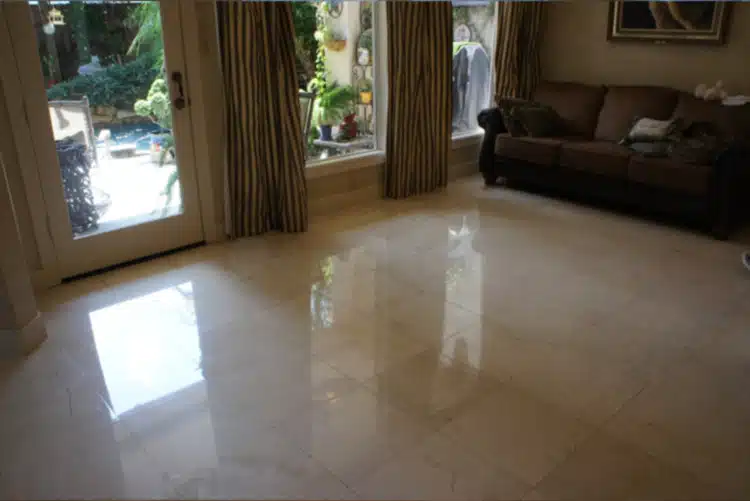
Marble Stone Honing and Polishing in Houston
Marble stone has been a popular choice for countertops and floors for centuries, thanks to its timeless beauty, durability, and elegance. Whether in a residential or commercial space, marble stone adds a touch of luxury and refinement. In Houston, Texas, residents and businesses have been turning to Modern Stone Care for their marble stone honing and polishing needs. With their experienced natural stone technicians and high-quality marble stone finishing services, Modern Stone Care helps transform marble surfaces to fit individual tastes and preferences. What is Marble Stone? Marble stone is a metamorphic rock that is formed from limestone under heat and pressure. It is composed mainly of calcium carbonate and exhibits a distinct crystalline structure, giving it its unique beauty. Marble is known for its variety of colors and patterns, ranging from pure white to deep blacks, with veining and swirls that are unique to each piece. Marble Stone for Countertops and Floors The versatility of marble stone makes it an excellent choice for both countertops and floors in residential and commercial spaces. In kitchens and bathrooms, marble countertops create a luxurious and sophisticated atmosphere. The smooth and reflective surface of marble adds an elegant touch to any space, enhancing its aesthetic appeal. Marble floors, on the other hand, add a touch of grandeur to entryways, hallways, and other high-traffic areas. The durability of marble stone makes it suitable for areas that require frequent cleaning and maintenance. The variations in color and patterns make each marble floor a work of art, making it a focal point in any room. Polished vs. Honed Marble When it comes to finishing marble surfaces, there are two primary options: polished and honed. Both finishes have their unique characteristics, and the choice depends on personal preferences and the desired look. 1. Polished Marble Polished marble is the most common and popular choice for countertops and floors. The polishing process involves using diamond abrasives to achieve a glossy and reflective surface. The result is a smooth and shiny finish that enhances the natural colors and patterns of the marble. The polished surface of marble creates a luxurious and sophisticated look. It is also resistant to staining, as the polishing process closes the pores of the stone and makes it less porous. However, the polished surface may show scratches and etches more easily than a honed finish. 2. Honed Marble Honed marble has a matte or satin […]
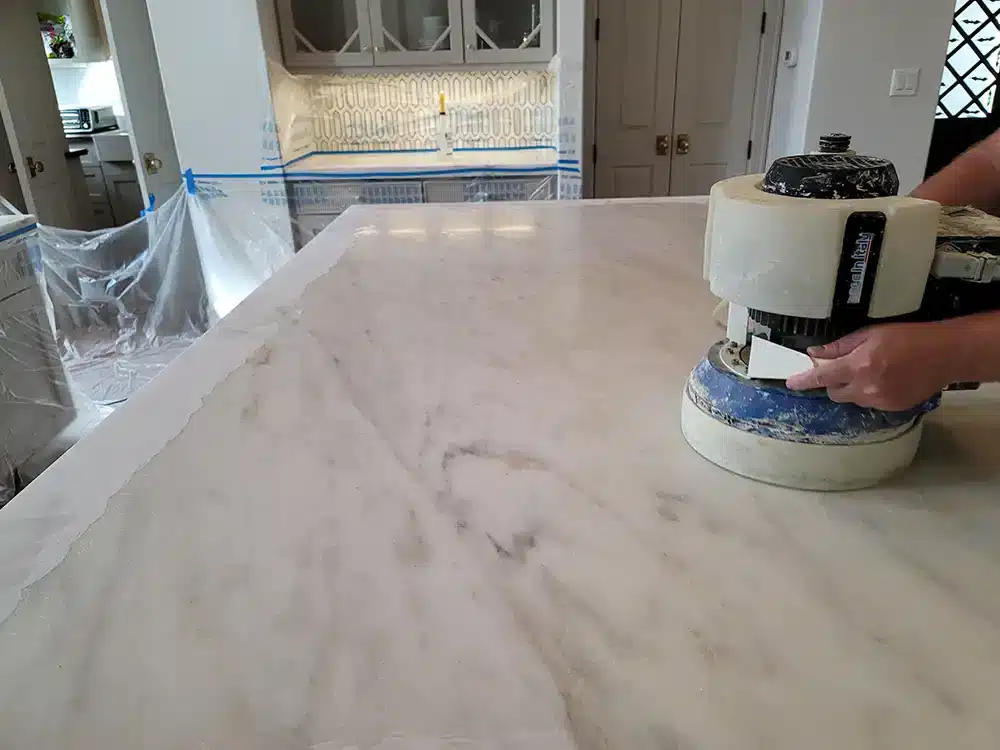
How Can I Protect My Natural Stone Surfaces from Etching and Stains?
Natural stone surfaces add a touch of elegance and sophistication to homes and businesses. Whether it’s marble, granite, limestone, or travertine, these materials are not only aesthetically pleasing but also durable. However, despite their resilience, natural stone surfaces are not impervious to damage. Etching and staining are common issues that can mar the beauty of these surfaces over time. In this comprehensive guide, we’ll delve into what natural stone is, the vulnerabilities of these surfaces, the household substances and activities that can lead to damage, the effective solutions provided by technicians at Modern Stone Care, the long-term effects of untreated staining and etching, preventive measures, and the importance of professional protection. Understanding Natural Stone Definition and Varieties: Natural stone is a geological formation that has undergone millions of years of transformation. It is extracted from quarries and includes a diverse range of materials, such as marble, granite, limestone, travertine, and slate. Each type of stone has its unique characteristics, colors, and patterns, making it a popular choice for countertops, flooring, and other surfaces. Properties of Natural Stone: One of the key attractions of natural stone is its durability. However, the composition of these materials can make them susceptible to certain types of damage. Most natural stones are composed primarily of minerals like calcium carbonate, which can react with acidic substances, leading to etching. Vulnerabilities of Natural Stone Surfaces Etching: Etching occurs when acidic substances come into contact with natural stone. This reaction causes the surface to corrode, resulting in dull spots or marks. Common acidic substances include citrus fruits, vinegar, and some household cleaners. Marble and limestone are particularly prone to etching due to their calcium carbonate content. Staining: Staining, on the other hand, is caused by the absorption of liquids into the porous surface of the stone. Common culprits include wine, coffee, oil, and food spills. Once absorbed, these substances can leave unsightly discolorations on the stone, diminishing its visual appeal. Scratching and Abrasion: While natural stone is durable, it is not impervious to scratching and abrasion. High-traffic areas or sliding heavy objects across the surface can result in scratches, wearing away the protective sealant and leaving the stone vulnerable to stains and etching. Common Household Substances and Activities That Lead to Damage 1. Acids: Foods and beverages containing acids, such as citrus fruits, tomatoes, vinegar, and certain cleaning products, can accelerate the etching process on natural stone surfaces. […]
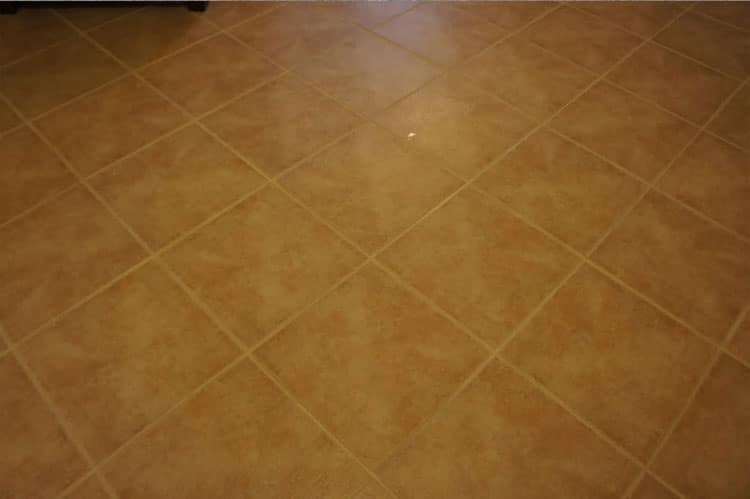
Reverse Deep Grout Stains With Modern Stone Care
Grout stains on tile countertops and flooring can be a persistent eyesore, diminishing the aesthetic appeal of your spaces. Over time, grout lines become breeding grounds for stubborn stains, mold, and bacteria, turning once pristine surfaces into dull and unhygienic areas. At Modern Stone Care in Houston, we understand the frustration that comes with stained grout and have perfected the art of reversing these deep-seated stains to restore the cleanliness and beauty of your tiled surfaces. The Hidden Menace Inside Grout: Grout, while serving as a crucial element in holding tiles together, can also become a haven for contaminants. It is porous by nature, making it susceptible to absorbing liquids, dirt, and other substances. This absorption not only causes discoloration but also provides a breeding ground for mold and bacteria. The microscopic pores in grout lines can trap moisture, leading to the growth of unsightly and potentially harmful microorganisms. Unclean grout not only affects the appearance of your tiled surfaces but also poses health risks. Mold and bacteria in grout can contribute to respiratory issues and allergies, making it essential to address stained grout promptly and effectively. The Ineffectiveness of DIY Solutions: In the quest to rid grout of stains, many homeowners turn to do-it-yourself (DIY) solutions. While these DIY remedies may seem like a cost-effective option, they often fall short in delivering lasting results. Common household cleaners and scrub brushes might provide a temporary improvement, but they fail to penetrate deep into the grout’s pores, leaving behind hidden stains and fostering an environment for future contamination. Additionally, abrasive cleaning methods can damage the surface of tiles and grout, compromising their structural integrity and longevity. DIY solutions may offer a quick fix, but they lack the precision and expertise required to address deep grout stains effectively. Unhygienic Alternatives: Some homeowners resort to using bleach or harsh chemicals to combat grout stains. While these substances may lighten the stains temporarily, they pose significant health and environmental risks. The fumes from strong chemicals can be harmful when inhaled, and residues left behind on surfaces may contribute to indoor air pollution. Furthermore, the use of harsh chemicals can accelerate the deterioration of grout and tiles, leading to a need for costly repairs or replacements in the long run. Modern Stone Care prioritizes the health and well-being of your living spaces, steering clear of harmful chemicals and opting for safe, yet powerful, solutions to […]
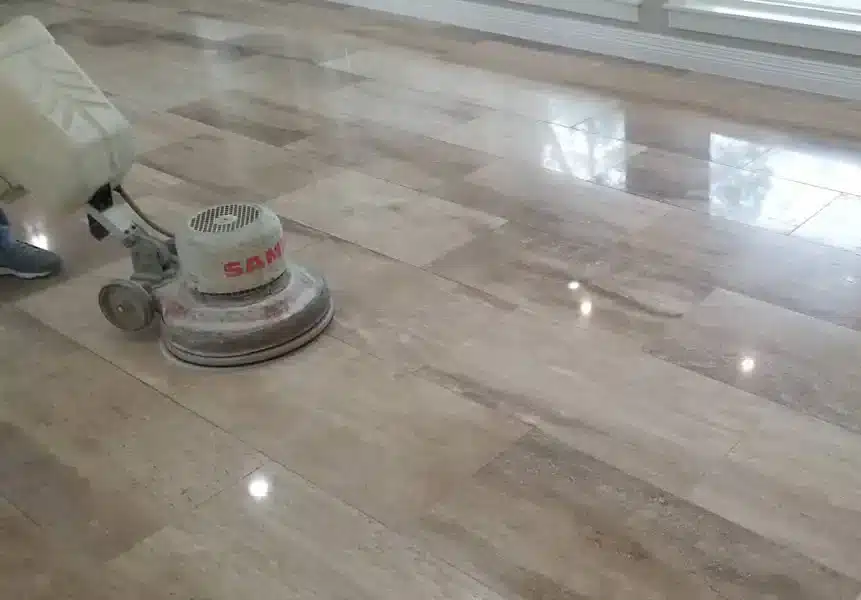
Professional and Affordable Natural Stone Care in Houston
In the heart of Houston, where architectural marvels and timeless elegance coalesce, natural stone surfaces grace many homes and businesses. From the warm embrace of travertine floors to the opulence of marble countertops, these exquisite materials add a touch of luxury and sophistication to any space. However, the key to maintaining the allure of natural stone lies in its proper care and maintenance. Modern Stone Care, based in Houston, stands as the guardian of your stone’s integrity, offering professional cleaning, sealing, polishing, and restoration services. In this blog post, we will delve into the importance of safeguarding your investment in natural stone and how our services ensure the longevity and enduring beauty of these surfaces. The Allure of Natural Stone: A Timeless Investment Natural stone is not just a building material; it’s an investment in elegance. Whether adorning the floors of your living room or the countertops in your kitchen, natural stone brings a sense of opulence and uniqueness to your space. However, its longevity and aesthetic appeal heavily rely on regular and meticulous maintenance. 1. Understanding the Vulnerabilities of Natural Stone: While natural stone surfaces are durable, they are not immune to wear and tear. Factors like foot traffic, spills, and exposure to the elements can lead to gradual deterioration. Porous stones, such as limestone and travertine, are particularly susceptible to staining and etching, making professional care imperative. 2. The Role of Professional Maintenance: Herein lies the crux – regular, professional maintenance is the key to preserving the integrity of your natural stone. Modern Stone Care in Houston specializes in a comprehensive range of services designed to protect and enhance the beauty of your investment. Our Specialized Services: A Shield for Your Stone At Modern Stone Care, we understand that each natural stone surface is unique, requiring a tailored approach to maintenance. Our arsenal of services encompasses everything from thorough cleaning to meticulous restoration, ensuring that your stone remains a testament to timeless elegance. 1. Cleaning: The Foundation of Preservation Regular cleaning is the first line of defense against the gradual wear and tear of natural stone. Our expert technicians utilize advanced cleaning techniques to remove dirt, stains, and contaminants without compromising the stone’s integrity. Whether it’s granite, marble, or travertine, we have the expertise to rejuvenate and refresh your surfaces. 2. Sealing: Guarding Against the Elements One of the most critical aspects of natural stone care is sealing. […]
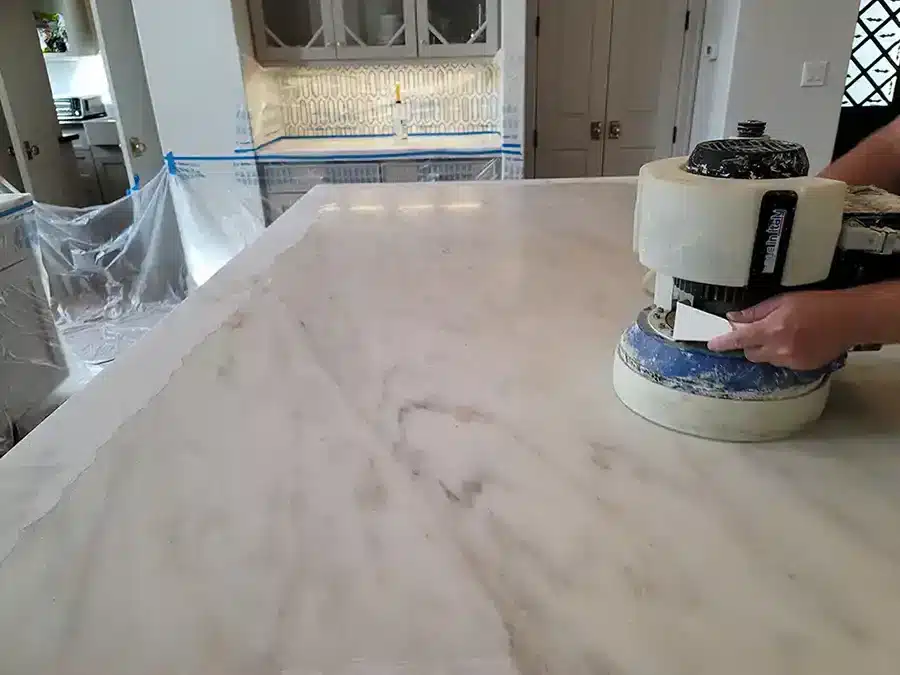
10 Things You Should Know About Maintaining Your Natural Stone Countertops
Natural stone countertops, such as granite, marble, and quartz, add an exquisite touch of elegance to any kitchen or bathroom. They are not only beautiful but also durable. However, to keep them looking their best and to extend their lifespan, proper maintenance is essential. In this blog post, we will delve into the ten most crucial things you should know about maintaining your natural stone countertops. We will also explain how the expert team at Modern Stone Care in Houston can assist you in preserving the beauty of your stone surfaces through their professional stone maintenance services. Choose the Right Type of Stone One of the initial decisions you’ll make when considering natural stone countertops is selecting the type of stone that best suits your needs. Granite, for example, is highly durable and resistant to scratches and heat. Marble, on the other hand, is known for its timeless beauty but is more susceptible to etching from acids like lemon juice. Quartz countertops offer the aesthetics of natural stone with enhanced durability and minimal maintenance requirements. The professionals at Modern Stone Care can help you assess your needs and preferences to determine the ideal stone for your countertops. They will provide guidance on the best stone type based on your lifestyle and offer a wide selection of materials for you to choose from. Regular Cleaning Is Key Proper cleaning is fundamental for preserving the beauty of your natural stone countertops. Avoid using abrasive or acidic cleaners, as these can damage the stone’s surface. Instead, opt for a pH-balanced stone cleaner or a mixture of mild dish soap and warm water. The team at Modern Stone Care offers specialized stone cleaning services using non-abrasive, stone-safe products. They can provide advice on the most suitable cleaning routine for your specific stone type and finish. Sealing Is Essential Natural stone is porous, making it vulnerable to staining if not properly sealed. Regularly sealing your countertops creates a protective barrier that repels spills and liquids. It’s essential to use a high-quality stone sealer suitable for your specific stone type. The professionals at Modern Stone Care can expertly assess the condition of your countertops and apply the appropriate sealer to ensure maximum protection. Their sealing services can help maintain the longevity of your stone surfaces. Mind the Heat While natural stone countertops are generally heat-resistant, it’s best to avoid placing hot pots […]
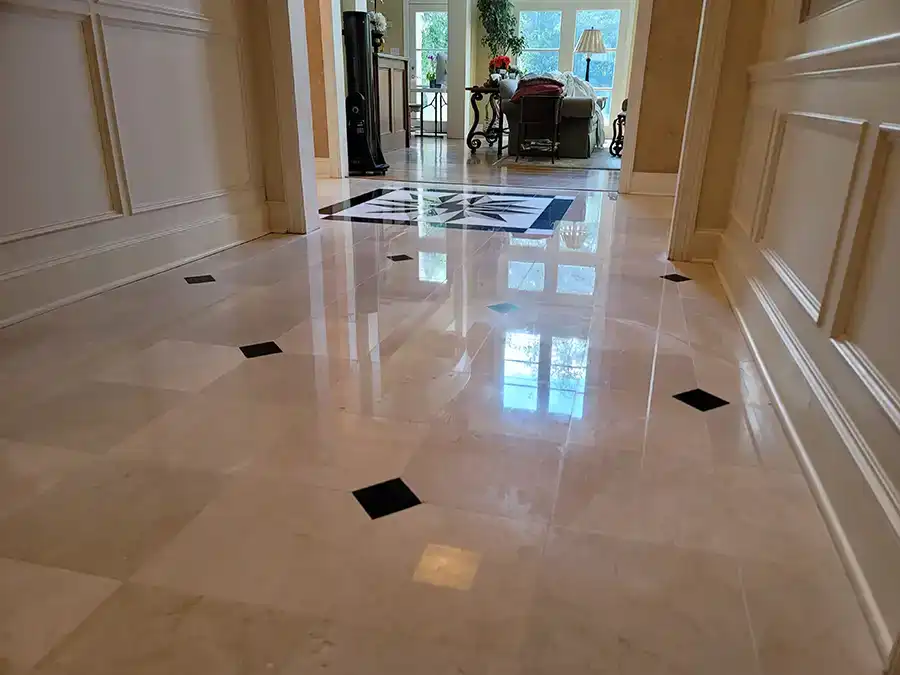
Routine Maintenance Can Make Your Natural Stone Last a Lifetime
Natural stone has a unique ability to elevate the aesthetic and add an air of timeless elegance to any space. Whether it’s the luxurious marble countertops in your kitchen or the classic travertine flooring in your living room, natural stone brings a touch of sophistication that is hard to match. What makes it even more remarkable is its durability – when properly cared for, natural stone can last a lifetime. In this blog post, we will explore how routine maintenance is the key to preserving the beauty and longevity of your natural stone surfaces. The Elegance of Natural Stone Natural stone, with its rich and varied colors, unique textures, and intricate patterns, can transform any room into a work of art. From the warmth of earthy slate to the opulence of glossy granite, these materials create a sense of luxury that man-made alternatives simply cannot replicate. The appeal of natural stone goes beyond its aesthetics. It’s known for its remarkable durability, making it an excellent choice for both residential and commercial spaces. When you invest in natural stone surfaces, you’re investing in a piece of history that can withstand the test of time. But here’s the catch: to enjoy the elegance of natural stone and make it truly last a lifetime, routine maintenance is essential. The Importance of Routine Maintenance Routine maintenance plays a pivotal role in preserving the beauty and longevity of your natural stone surfaces. Here are the key aspects of maintenance that every stone owner should be aware of: Regular Cleaning: Day-to-day cleaning is the first step to maintaining your natural stone surfaces. Dust and dirt can slowly wear away at the stone’s finish over time. Use a soft, damp cloth or mop to clean the surface regularly, and avoid using harsh chemicals that can damage the stone’s integrity. Professional Cleaning: While regular cleaning helps prevent the buildup of dirt and grime, it may not be sufficient to remove deeper stains and restore the stone’s original shine. Periodic professional cleaning is crucial to keep your stone surfaces in top condition. Professional stone care experts have the knowledge and tools to clean and restore your stone surfaces without causing any damage. Stone Sealing: One of the most important steps in natural stone care is sealing. Sealing your stone surfaces creates a protective barrier that prevents liquids and stains from seeping into […]
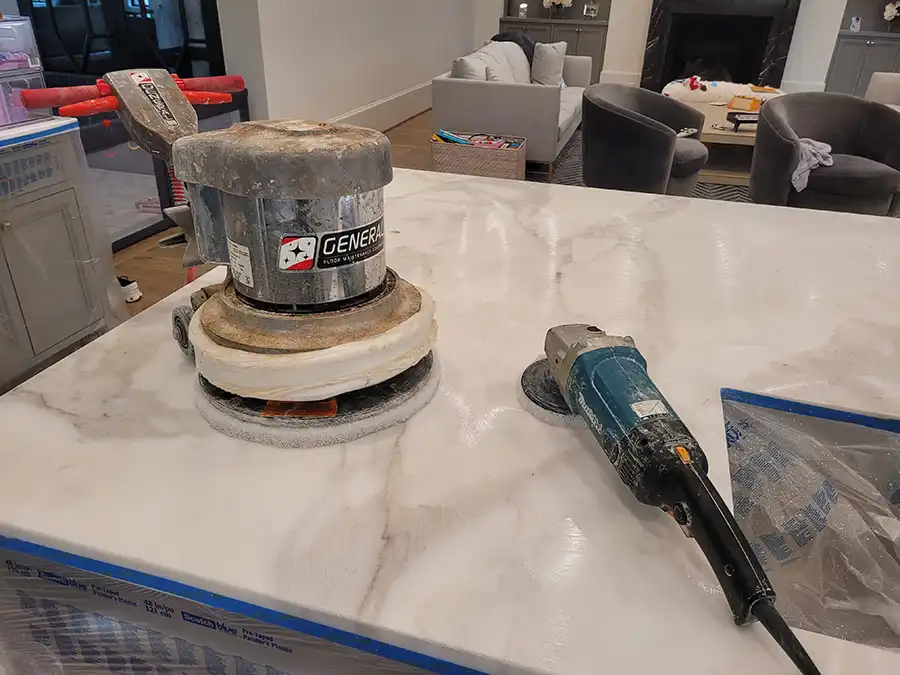
Is the Seal on My Stone Countertop Worn Down?
Stone countertops are a stunning addition to any home, offering both elegance and durability. However, to maintain their beauty and protect them from stains and damage, it’s crucial to ensure they are properly sealed. Over time, the seal on your stone countertop may wear down, leaving your investment vulnerable to harm. In this blog post, we will explore the signs to look for to determine if your stone countertop’s seal is worn down, how to test the seal’s effectiveness, and how often you need to reseal your stone surface. We’ll also highlight the importance of professional stone sealing in Houston for preserving your countertops. Signs of a Worn-Down Stone Countertop Seal Before we dive into the details of stone sealing, let’s discuss the common signs that indicate your stone countertop seal may be wearing down: Water Absorption: If you notice that water or other liquids no longer bead up on the surface of your stone countertop but instead quickly absorb into the stone, this is a clear sign that the seal is compromised. This increased water absorption can lead to staining and damage over time. Stains and Discoloration: Stains that were previously easy to clean now seem to cling to the stone, or you notice a darkening of the stone’s surface. These stains are a surefire indication that your stone countertop’s seal has lost its effectiveness. Dull Appearance: Over time, a stone countertop that was once shiny and vibrant may start to look dull and lackluster. This can be attributed to the seal wearing down and the stone becoming more susceptible to dirt and wear. Scratches and Etches: Your stone countertop may start showing signs of surface damage, such as fine scratches or etch marks. These imperfections are more likely to occur when the protective seal is no longer present. How to Test Your Stone Countertop Seal To determine the effectiveness of your stone countertop seal, you can perform a simple water droplet test. Here’s how to do it: Clean the Surface: Start by cleaning your stone countertop with a mild, pH-balanced stone cleaner. Ensure it’s dry and free of any residues. Prepare Water Droplets: Take a small amount of water and pour it onto the countertop’s surface. Be sure to use clean, room-temperature water. Observe Beading: Watch how the water reacts. If the water forms small, round beads that stay […]
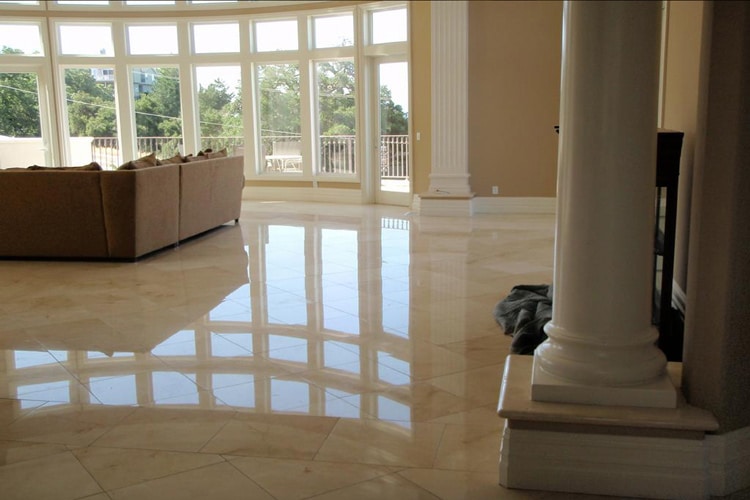
What Are the Maintenance Differences Between Honed and Polished Marble Surfaces?
Marble surfaces have long been admired for their timeless beauty and elegant appearance. Whether in a grand foyer, a luxurious bathroom, or a gourmet kitchen, marble adds a touch of opulence to any space. However, when it comes to maintaining the pristine look of marble, there are two primary finishing options to consider: honed and polished. In this blog, we’ll explore the differences in appearance, the processes of honing and polishing, and the maintenance required to keep both finishes looking their best. The Look: Honed vs. Polished Before diving into maintenance, let’s first understand the visual distinctions between honed and polished marble surfaces. Honed Marble: Honed marble has a matte or satin finish that offers a softer and more understated appearance compared to polished marble. When you run your hand over honed marble, it feels smooth but lacks the high-gloss sheen associated with polished marble. This finish enhances the natural color and veining of the stone while reducing the glare and reflections often seen on polished surfaces. Honed marble exudes a subtle elegance and a tactile appeal that many homeowners find appealing. Polished Marble: Polished marble, on the other hand, boasts a glossy, mirror-like finish that is both luxurious and striking. The surface is smooth to the touch, and it reflects light beautifully, creating a bright and airy ambiance in any space. Polished marble intensifies the depth of color and enhances the stone’s natural patterns, creating a vibrant and glamorous look. Its lustrous appearance is a classic choice for upscale interiors. The Process: Honing and Polishing The difference in appearance between honed and polished marble surfaces is primarily achieved through distinct finishing processes. Honing: Honing is the process of grinding the marble surface with abrasives to remove a thin layer of the stone, revealing a matte finish. This process also eliminates any imperfections, such as scratches or etches, resulting in a smooth and uniform surface. Honed marble maintains the stone’s natural color and veining while offering a tactile and refined appearance. Polishing: Polishing involves using progressively finer abrasive materials to create a smooth, glossy finish on the marble surface. The process brings out the full depth of color and highlights the intricate veining of the stone. Polished marble is achieved through meticulous grinding and buffing, resulting in a highly reflective and stunning surface. Maintenance: Honed vs. Polished Marble Now that we’ve covered the […]
